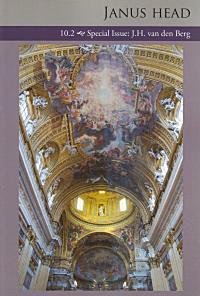 Janus Head Janus Head
10.2
Special Issue
J.H. van den Berg

Beyond Time
New & Selected Work
1977 - 2007
Robert Gibbons
 The Age of Briggs & Stratton The Age of Briggs & Stratton
Peter Culley
|
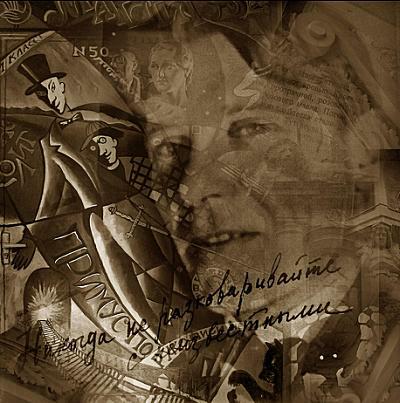
Michail Bulgakov
May 15, 1891 – March 10, 1940
image by
seriykotik1970
.....................................................
How sad, ye gods, how sad the world is at evening, how mysterious the
mists over the swamps. You will know it when vou have wandered astray in
those mists, when you have suffered greatly before dying, when you have
walked through the world carrying an unbearable burden. You know it too when
you are weary and ready to leave this earth without regret; its mists, its
swamps and its rivers ; ready to give yourself into the arms of death with a
light heart, knowing that death alone can comfort you.
The magic black horses were growing tired, carrying their riders more
slowly as inexorable night began to overtake them. Sensing it behind him
even the irrepressible Behemoth was hushed, and digging his claws into the
saddle he flew on in silence, his tail streaming behind him.
Night laid its black cloth over forest and meadow, night lit a
scattering of sad little lights far away below, lights that for Margarita
and the master were now meaningless and alien. Night overtook the cavalcade,
spread itself over them from above and began to seed the lowering sky with
white specks of stars.
Night thickened, flew alongside, seized the riders' cloaks and pulling
them from their shoulders, unmasked their disguises. When Margarita opened
her eyes in the freshening wind she saw the features of all the galloping
riders change, and when a full, purple moon rose towards them over the edge
of a forest, all deception vanished and fell away into the marsh beneath as
their magical, trumpery clothing faded into the mist.
It would have been hard now to recognise Koroviev-Faggot, self-styled
interpreter to the mysterious professor who needed none, in the figure who
now rode immediately alongside Woland at Margarita's right hand. In place of
the person who had left Sparrow Hills in shabby circus clothes under the
name of Koroviev-Faggot, there now galloped, the gold chain of his bridle
chinking softly, a knight clad in dark violet with a grim and unsmiling
face. He leaned his chin on his chest, looked neither at the moon nor the
earth, thinking his own thoughts as he flew along beside Woland.
'Why has he changed so? ' Margarita asked Woland above the hiss of the
wind.
'That knight once made an ill-timed joke,' replied Woland, turning his
fiery eye on Margarita. ' Once when we were talking of darkness and light he
made a somewhat unfortunate pun. As a penance he was condemned to spend
rather more rime as a practical joker than he had bargained for. But tonight
is one of those moments when accounts are settled. Our knight has paid his
score and the account is closed.'
- Michail Bulgakov, The Master and Margarita, translated by Michael Glenny
.....................................................
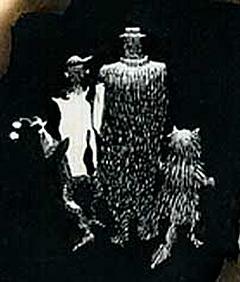
The Threesome
Irina Shipovskaia
The Master and Margarita
Mikhail Bulgakov
Translated by Mirra Ginsburg
google books
The Master and Margarita
Mikhail Bulgakov
Translated by Richard Pevear and Larissa Volokhonsky
The Heart Of A Dog
Michail Bulgakov
translation by Michael Glenny
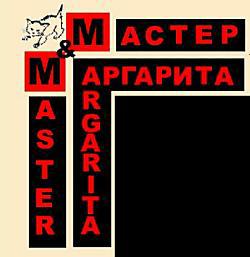
The Master & Margarita pages
Kevin Moss
_______________________
Writing into the Space of the 'Other'
Susanne Gannon
The question of the Other that I have so blithely taken up in my title remains open. Who is this Other to whom I make reference? Where are we together in the text? This is of course a key contemporary dilemma for social science: how to avoid coercive representation, exploitation, colonization in both research and writing practices. Multivocal, layered representations of data, which write the author in, performance ethnographies and autoethnographies figure amongst the responses to this dilemma. Yet I want to suggest in this paper that remaining within the deceptively safe embrace of our own lived experience has its limitations. It is, after all, at least in part a failure of the imagination that enables human rights abuses in all parts of the globe. The problem of the Other is pivotal to contemporary philosophy. Questions of identity, subjectivity and otherness have been contentious across all domains of contemporary social theory and are often invoked to differentiate between humanist/ modernist versions of human subjects as individualized and separate, and postmodern/ poststructural versions of subjects as discursively constituted within webs of social relations. Elizabeth St. Pierre, for example, describes the Cartesian dualism of body and mind as realized through “the master binary of self/Other”. Feminist philosophers Adriana Cavarero and Judith Butler, most notably, turn to the scene of the Other in their recent work, theorizing an ethics of engagement and response-ability that also has implications for how we think about the texts we produce. In this paper I take up some of their work to explore my own experiments in writing....(more)
Outskirts: feminisms along the edge
via Dialogic
_______________________
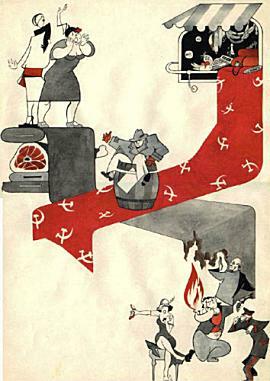
Illustrations
Helen Yeskova
_______________________
Leftovers / The Orienting Stone
D. Graham Burnett
cabinet
The “otolithic organs,” as they are known, are a pair of sensors—the utricle and the saccule—nestled in the labyrinthine architecture of the inner ear. Grossly speaking, each consists of a bunch of tiny pebbles (of the white rock known as calcium carbonate) embedded in a gooey wad that sits atop a carpet of delicate hairs. The saccule is roughly vertical in our heads, and the utricle more or less horizontal. Together they orient us in the world, since they work as tiny inertial references: raise your head suddenly (or get in a jerky elevator), and the pebbles of the saccule get momentarily left behind as your skull starts upward; this bends down the hairs against which those pebbles lay, and the sensitive hairs function like switches, sending signals to your brain that you register as a feeling of ascent. The utricle does the same work for motion from side to side, and between them these tiny organs generate the neurological data that give us our normal sense of being in the world. What would it feel like not to have those pebbles? Delete them from a mouse and it spends a lot of time falling over.
Both the utricle and the saccule contain what I have called “pebbles,” but they are little more than mineral crystals really, microscopic sand bound together into a mass by a matrix of protein. Not so the homologous structures in fish, our evolutionary ancestors. They retain, inside their skulls, quite clearly defined, and nearly always large enough to see (and sometimes as large as marbles), healthy little rocks known as otoliths, or “ear stones.” The minute pebbles of our otolithic organs would appear to be the powdered remains of these ancestral lithic pips. It is in this sense that I said we carry within us the “vestiges” of an orienting stone; only our oceanic kin secrete such a thing in an intact form. It is as if, in the course of evolutionary time, our inner al-hajar al-aswad came under the hammer of an angry god. We are, as it were, hanging on after this blow, but our sense of the center may not hold quite as it should....(more)
_______________________
Draft 74: Wanderer
Rachel Blau Duplessis
fascicle
Book I
This the place where hopes had left
their traces, stark in storm,
stoked in “astonishing nights, foreigners among humans,”
whose eye thirl, window whorl they Open Wide
seeking wordth and depth,
if ever, given
ques and querl, this wordth and depth could be,
and want to speak to sight, to sigh and
rage, not for that hour, nor for that place
yet nowhere
unembellished by some trace,
documentary (that and more), witnessing (that
many more) and witless, hurtful, “jesting air”—en-
joined, frozen in mo ti on but not to crumble, rather
stand. This has to stand, inside, longside as
It; and yet is split, is double split, in impulse, turn, and goal.
Still somehow moves (un-
sanctioned? leaden?) fated, stripped,
by road or pathway or through trackless field,
Up hill or down.
What hope then for the wanderer?
Yet and Yet and Yet in place.
Aura of words in a storm face.
There are plenty of reasons to wonder.
(....)
Book X
The loops of thought and new-mint sound
began to rise along the toil of push.
Or this was just posturing. It was
really the small crumple exaggerated
pinch and poke; poppit, prime and pry.
So from the rubbish gathered up a stone.
Then from the rubble gathered up a stone.
One for the heavy-laden grave.
Two for the split in the person.
Three, three,
and on and on.
But then began a rubble wall.
random pieces placed in counter-poise.
Slate, granite and conglomerate,
sandstone, limestone,
brick, and shale
wedged up from field or quarried from,
or found and piled, or gathered up
at the dusty sides of road.
The force retained as each rock balances.
The brightened chips of brick
get set at angles.
Sometimes such a wall will stand, or
even under pressure
simply shatter round the edge
because of energy. The properties
of various
stones and of mixed
elements
allow for inner motion and for
give and hold.
This is one thought, sometimes proportionate.
Although sometimes not.
Voices of the dead give speeches on these principles of physics.
...(more)
_______________________
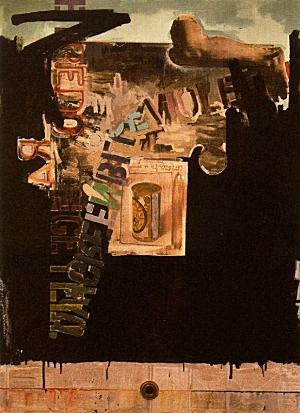
Decoy
Jasper Johns
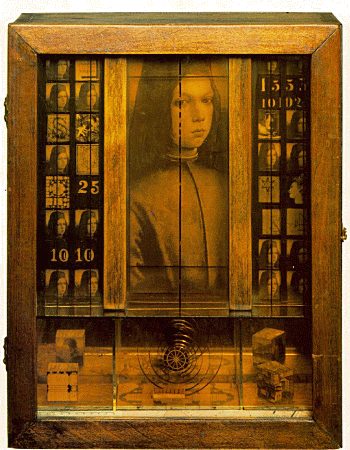
Joseph Cornell
_______________________
Empire@Play: Virtual Games and Global Capitalism
Nick Dyer-Witheford and Greig de Peuter
ctheory
What makes virtual games' technocultural form exemplary of Empire is their identity with its key means of production, communication and destruction--the digital network. More than any previous media other than the book, virtual play is a direct offshoot of its society's crucial technology of power. (....)To situate games in Empire we must, however, discuss not only their political economy but also the psycho-cultural valences. If virtual games are implicated in armored globalization, how do they support, or subvert, the subjectivities such a regime requires? And how can we answer this question without resorting to notions of hypodermic "media effects" or at assuming the success of every ideological interpellation? In a spirit of radical empiricism, we look at the articulation of virtual and actual practices. That is, we identify concrete linkages between in-game and real-life activity, examining how virtual play is connected to and articulated with other institutions, sites and practices, plugged in to barracks and battle spaces, work cubicles and call centers, investment banks and stock exchanges to form new virtual-actual assemblages. Here, we'll quickly examine three nodes in this imperial gamespace--war, work and finance. ...(more)
_______________________
If you are a poor, hapless Afghan civilian whose family's bodies were ripped apart by U.S. bombs, does it really make a difference to you if the air "strikes" were ordered by the Moron from Texas, George W Bush, or the Agent of Change, Barack Obama? I would think not. If you were a Pakistani civilian whose village had been bombed by the U.S. would your heart be comforted by the fact that the mad bombers have a new, young, hip "Commander-in-Chief" who makes funny jokes to all the stenographers known as "The Washington Press Corps"? I sincerely doubt that as well.
-
Dan Spielberg
List of 140 Afghan Killed In US Attack Includes 93 Children
_______________________
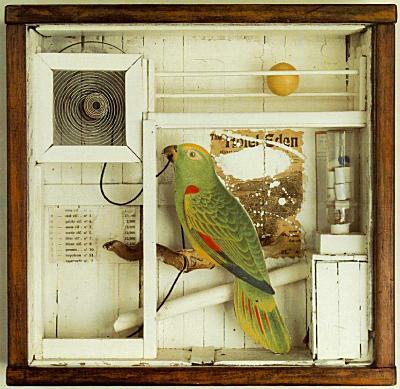
hotel eden
Joseph Cornell
1903-1972
_______________________
Trust Theory
Patrick Harrison
n+1
Ironically, what separated Hardt from the rest of the speakers at the conference ("On the Idea of Communism") was his distinctly American desire for everybody to get along. "My usual response is always to agree with people," he began to respond to a member of the audience who criticized the lack of attention to cultural hierarchies in his concept of "the multitude." Hardt continued with a humorous litany of apologies and self-effacing concessions—"So my way of agreeing with you on this … and I could easily criticize myself for this … "—but was unable to convince the questioner that he was actually in agreement with her. His intellectual performance came straight out of the ramshackle, pleasantly inconclusive manner of American literary studies seminars, where discourse proceeds by dialogue, constructive criticism, and synthesis of a diversity of possible "readings" rather than by the militant "line struggle" favored by the Badiouvians with whom he shared the stage.
I had always dismissed Hardt, with the kind of macho contempt that comes from reading too much Žižek, as a crypto-liberal who was too politically weak, too theoretically softheaded, and just too American to be a genuine radical. And in person he proved to be every bit the doe-eyed naïf he seemed on the page. It is an index of the just how strong a disillusioning effect the conference had on me and my enthrallment with the Badiou-Žižek complex that, by the end of the three-day event, I had completely reversed my attitude towards Hardt. What I used to see as weakness in Hardt, by the end I saw as an unpretentious generosity which was sorely lacking in the general vibe. More so than any shortcoming in the philosophical ideas presented at the conference, this lack in the performative mode of the event was its most serious failure....(more)
_______________________
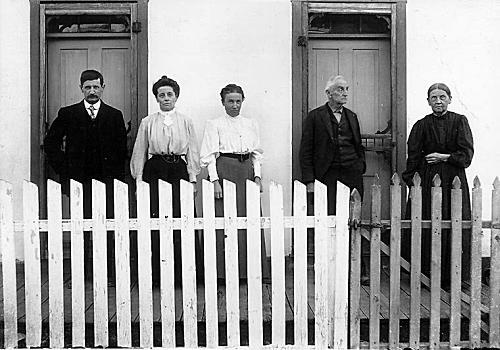
Family Reunion
Francis L. Cooper
1874-1944
Avocational Photographer
_______________________
Divine madness:
the dilemma of religious scruples in twentieth-century America and Britain
Joanna Bourke
Prior to the Second Vatican Council of the 1960s, scrupulosity was regarded as the excessive fear of sinning. Calling an individual "scrupulous" drew attention to a serious state of existence that included fanatical performance of religious devotion combined with an overwhelming burden of spiritual doubt. In other words, scruples were an extreme type of spiritual terror. For sincere believers, fearing the Christian deity was an appropriate response to His omnipotence--but for the scrupulous believer, an excessive fear of God ruined their lives, destroying peace of mind and confidence of spirit. In contrast, today, accusing someone of possessing scruples merely signals that they are religiously observant or morally exacting.
The extreme state of religious dread of sin is often presumed to have disappeared from modern American and British societies. The religious scruples, which tormented believers in earlier centuries, are seen as failing to survive the cynical secularization of modernity. As we shall see in this article, understanding and helping individuals suffering from scruples used to be regarded as the preserve of religious advisers, particularly priests. From the early decades of the twentieth century, however, the burgeoning psychiatric profession challenged pastoral diagnoses, substituting the secular, pathological label of obsessional-compulsive disorder (OCD) for the religious term "scruples". There was increasing assent that lengthy prayers and cleansing rituals were examples of "undoing" in which "the initial instinct to blaspheme and break with religious practice" was "distorted into the opposing compulsive rituals." Unequivocally, Joseph W. Ciarrocchi in The Doubting Disease (1995) determined scruples to be a psychiatric, not religious disorder. It was an OCD as defined by the American Psychiatric Association's The Diagnostic and Statistical Manual of Mental Disorders IV. How were the respective jurisdictions of theologians and confessors on one side and psychiatrists and clinical psychologists on the other side to be decided, and what were the consequences for those who suffered from this affliction?...(more)
Journal of Social History Spring, 2009
_______________________
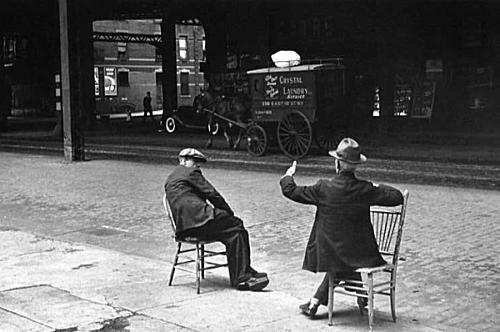
Helen Levitt: A Memorial Tribute
Laurence Miller Gallery
via
_______________________
Happy-Book
Balázs Györe
Translated by Tim Wilkinson
Hungarian Quarterly
(....)The consultant has prescribed a new medicine for my wife, because what she has been taking up to now had no effect. It is so new that it is not yet obtainable at the pharmacy. "Free medical sample. Not for sale" is printed on the box. It has an odd name (odd to us, at any rate): Zyprexa. Not easy to pronounce. Its "alternative" or "non-proprietary" or "generic" name is olanzapine. It means nothing to us. Will this funnily named medicine (which has since been introduced commercially) bring about an improvement? Will taking one tablet twice a day mean healing? Why should I not put the question that way? Eli Lilly & Company Ltd, Basingstoke, England. Is happiness to come from English climes? Is the starting-point of recovery 70 km from London? In a factory? What a distance! What paths, immeasurable remotenesses, must the soul travel in order to be well again? Is happiness concealed in pills?
Let us try to track delight, step by step! Let us try to nab it, catch it in the act! Let us try to learn the technique of delighting- from Hemingway, for instance!
I have fourteen slips of paper at present, set largely in order. Is that too many or too few? I have filled up both sides of twelve of them with my writing; only two have an empty verso.
Again I have to correct myself: those mouldering benches about which I asserted earlier that one could not sit on them ("it could be no one at all had sat on them since time immemorial"), well, one can. During our stroll today we saw them being used. We even walked by the people who were resting on them. They were sunning themselves. We strolled up as far as the night-time sanatorium.
I like these strolls, but what about my wife? I wonder if she too likes these slow steps. And this is why she learned to walk? For these belated, bitter steps? We walk hand in hand. For me the breath of air is as though we were in our own garden. "These strolls are very good. Fallen leaves under my feet and the mellow calmness of the misty evening." I have had to switch to another book. "Trees, and our house... And our house has a magic spell, with wisps of grass, dried walnut leaves, pictures, books, Mariska, a chopped-down cherry tree. That has something to do with happiness too." I had to switch for a short while into "the garden of our own house", "the misty evening", but I am now back here again, in the bright afternoon. "A shiver of a sort of sense of happiness passed through him." We have nothing, only our shadows. Night-dress on my wife, white shorts on me.
We spot the man who at the same time, day after day, suddenly hoves into sight amongst the trees. He runs. Cropped hair, bared chest. Our observations suggest he makes several circuits of the park. His pace is swift; he must already be behind the main building. An athletic body. Who can he be, we ask each other every time we glimpse him. An athlete? A patient? Whoever he may be, I pay the man my respects, unknown as he is. I like runners.
The bulky trunks of two trees are girdled by iron railings- to protect them. From what or whom? Who would harm the trees here? On the ground are big-bodied ants, scattered; they do not swarm, only scramble around, seemingly at random. ...(more)
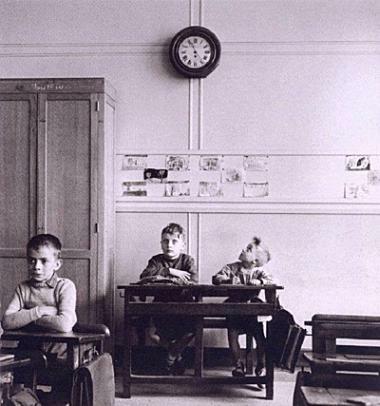
Robert Doisneau
(1912-1994)
_______________________
Blog-based Peer Review: Four Surprises
Noah Wardrip-Fruin
Last year we undertook an experiment here: simultaneously sending the manuscript for Expressive Processing out for traditional, press-solicited peer review and posting the same manuscript, in sections, as part of the daily flow of posts on Grand Text Auto. As far as I know, it became the first experiment in what I call "blog-based peer review."(....)Blogging had already changed how I worked as a scholar and creator of digital media. Reading blogs started out as a way to keep up with the field between conferences, and I soon realized that blogs also contain raw research, early results, and other useful information that never gets presented at conferences. Of course, that is just the beginning. I cofounded Grand Text Auto, in 2003, for an even more important reason: blogs can foster community. And the communities around blogs can be more open and welcoming than those at conferences and festivals, drawing in people from industry, universities, the arts, and the general public. Interdisciplinary conversations happen on blogs that are more diverse and sustained than any I’ve seen in person.
Given that digital media is a field in which major expertise is located outside the academy (like many other fields, from noir cinema to Civil War history), the Grand Text Auto community has been invaluable for my work. In fact, while writing the manuscript for Expressive Processing I found myself regularly citing blog posts and comments, both from Grand Text Auto and elsewhere. ...(more)
Expressive Processing
Digital Fictions, Computer Games, and Software Studies
Noah Wardrip-Fruin mit pressvia if:book
_______________________
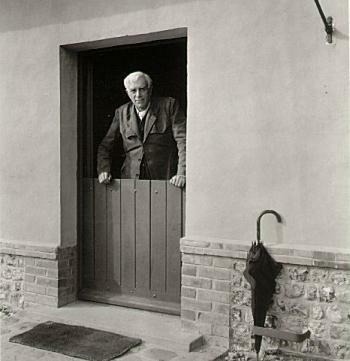
Georges Braque
13 May 1882 – 31 August 1963
photo by Robert Doisneau
171 images
_______________________
Decoupling From Reality
James Howard Kunstler
The Great Wish across America is to resume the life of comfort-and-convenience that seemed so nirvana-like just a few short years ago, when the very constellations of the heavens might have been renamed after heroic Atlanta realtors and Connecticut hedge fund warriors, and the boomer portfolios groaned with earnings, and millions of graying corporate salary mules dreamed of their approaching retirement to a satori of golf and Viagra, and the interior decorators grew so rich installing granite countertops that they could buy their own houses in the East Hampton, and every microcephalic parking valet in Las Vegas qualified for a bucket full of Ninja mortgages, and Lloyd Blankfein could dream of divorcing his wife to marry his cappuccino machine.
The choices now are stark and the kind of life on offer by the future is rather austere. The job of the current president, and the people who work with him, is to manage an epic contraction -- let's say, to land a very large, loaded defect-ridden airplane that has both run out of fuel and suffered grievous mechanical breakdown... and to bring down that vehicle in an unfamiliar country filled with angry savages. Sadly, the new president and his co-pilots just want to keep the plane up there, circling. The president's viziers are working round-the-clock to come up with some way, some toggle-switch, that might turn off the laws of gravity (which are not unrelated to the laws of thermodynamics). But all they seem to be able to come up with are mumbled prayers that are pale imitations of the algorithms once concocted by the Wall Street engineers who designed the aircraft they're riding in....(more)
_______________________
Becoming What We Seek to Destroy
Chris Hedges
The bodies of dozens, perhaps well over a hundred, women, children and men, their corpses blown into bits of human flesh by iron fragmentation bombs dropped by U.S. warplanes in a village in the western province of Farah, illustrates the futility of the Afghan war. We are not delivering democracy or liberation or development. We are delivering massive, sophisticated forms of industrial slaughter. And because we have employed the blunt and horrible instrument of war in a land we know little about and are incapable of reading, we embody the barbarism we claim to be seeking to defeat.
We are morally no different from the psychopaths within the Taliban, who Afghans remember we empowered, funded and armed during the 10-year war with the Soviet Union. Acid thrown a girl’s face or beheadings? Death delivered from the air or fields of shiny cluster bombs? This is the language of war. It is what we speak. It is what those we fight speak....(more)
_______________________
The Dadameter
Global index of the decay of the aura of language
Imagine a world of transparency where all desires are negotiated on a global market and their risks are evaluated and optimized.
The Dadameter is a tool for the profiling of language at large scale and the historical tracking of artistic and literary movements. It brings about a new alliance between art, science and global finance.
We use up-to-date 2.0 trend analysis and data visualization technologies, neural networks, graph theory or quantitative structural linguistics in order to be able to predict the next artistic craze.
via diapsalmata
_______________________
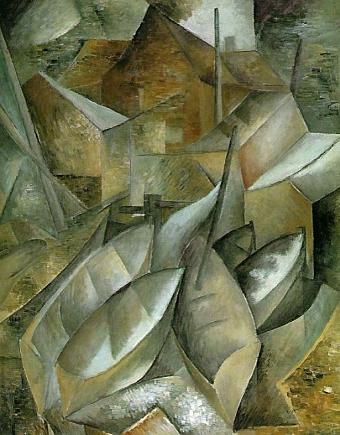
Georges Braque
_______________________
A Matter of Enthusiasm
Raymond Federman
I am rereading Malone Dies
just to mock death a little
and boost my cancerous spirit.
(....)
All is ready. Except me. I am being
given, if I may venture the expression,
birth to into death, such is my impression.
The feet are clear already,
of the great cunt of existence.
Favorable presentation I trust.
My head will be the last to die.
Haul in your hands. I can’t.
The render rents, My story ended
I’ll be living yet. Promising lag.
That is the end of me. I shall say I no more.
...(more)
_______________________

Le Manege de Monsieur Barre
Robert Doisneau
1955
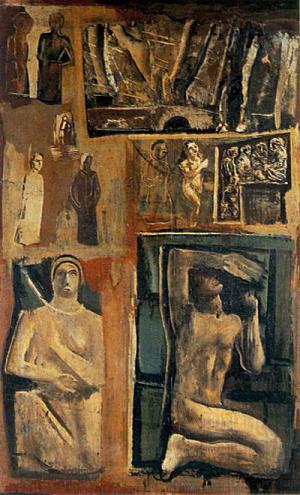
Mario Sironi
May 12, 1885 – August 13, 1961
_______________________
Revisiting The Natural Contract
Michel Serres
translation by Anne-Marie Feenberg-Dibon
ctheory
As soon as human technology started using heat, vaporous mixtures expanded everywhere in all directions and at random; recent core sampling of glacial inlandsis have been able to date the beginning of the bronze age almost to the year, thanks to traces of the first effluents emitted by archaic ovens in the Middle East which were dispersed everywhere and carried by snowfall to those high latitudes. Who would have thought that globalization started as early as our prehistory?(...)
Little by little globalization forms a new universe based on thermal techniques and developed further by the quantitative increase of world-objects. We see these now as technical, physical, and we will soon see them as human and legal as well. Can we still call these things objects, and the people who use them subjects? Are our communication networks objects?(...)
The law I propose follows the new death. Certain elements of world opinion and politics during the next years of the 21st century will be linked to these legal questions.
And so I prefer Goya's painting the description of which opens The Natural Contract to the master-slave dialectic. A pair of enemies are fighting in quicksand. With every blow dealt to the adversary, their legs sink into the sludge, ever deeper as the energy spent in combat increases. Since the dawn of history, we have only seen the belligerents in the grand spectacle of the battle and have only been interested in the question of who will win or lose, who will become the master by subduing or killing the slave?...(more)
_______________________
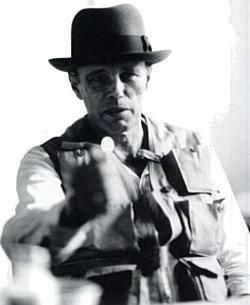
Joseph Beuys
b. 12 May 1921
Beuys passes on the flame
What Is Art?: Conversation with Joseph Beuys
google books
Segment from State of the Art, Imagination
Joseph Beuys
23 min. video Beuys at UbuWeb Sound
7000 Oaks - Joseph Beuys
During his long and productive career, Beuys helped introduce international audiences to conceptualism, concretism, Fluxus, live performance, site-specific installation and other ecological-experimental forms of art. He took up the torch of “art for the mind” from Marcel Duchamp and carried it forward, using symbolic narratives from his own survival of wartime ordeals, while radically challenging consumerist culture, materialism and instant gratification. He was an evolutionary revolutionary, teacher, funny man, shaman and poet. His message: Culture has the power to change the world (exhibit A: the 7,000 trees Beuys planted at Documenta in Kassel), and art is the only revolutionary power that can free humankind from repression.
-
Valery Oisteanu
_______________________

Medusa Gorgon
1955
Joseph Beuys 191 images
_______________________
A Cat in the Throat
On bilingual occupants
Caroline Bergvall
jacket
There’s a very nice variation on the ‘you must begin where you are’ word of wisdom. It comes from the postcolonial critic Gayatri Spivak. In an early interview with the Chicano poet and bicultural thinker Alfred Arteaga, Spivak talking about Samuel Beckett says about the bilingual writer: ‘One must clear one’s throat, clear a space, step away, spit out the mother tongue, write in French’. This is a surprising physiological analogy through which to question connections between body and language. A lingual event is taking place, not in the voice but rather in its absenting, in the clearing of the throat.
It certainly throws another relief on the nativist myth often given to language belonging, that one’s body is unalterably the shape of one’s first language. She further sees in bilingual identity the potential for a ‘self-conscious, self-separating project… a clearing of space’. Her embodied yet detached understanding provides a clue to a self-aware and contextual cohabitation of languages and provides one way out, as it were, of the cultural displacements frequently experienced by bilingual and bicultural speakers. Spitting out the most intimate and most irretrievable, the most naturalised source language, or so-called mother tongue (this gendering always strikes me as deeply problematic), is a dare, it is dangerous, but it also starts a whole process of re-embodying and re-appraisal of language’s spaces. To be in language is not only to be caressed, held, nurtured by ‘intuitive’ or tonal waves of recognition and belonging. ...(more)
_______________________
The quotation in my works are like robbers lying in ambush on the highway to attack the passerby with weapons drawn and rob him of his conviction."(...)
Benjamin, who for his entire life pursued the idea of writing a work made up entirely of quotations, had understood that the authority involved iby the quotation is founded precisely on the destruction of the authority that is attributed to a certain text by its situation in the history of culture.(...)
This particular way of entering into a relation with the past also constitutes the foundation of the activity of a figure with which Benjamin felt an instictive affinity: that of the collector. The collector also "quotes" the object outside its context and in this way destroys the order inside which it finds its value and meaning.(...)
The interruption of tradition, which is for us now a fait accompli, opens an era in which no link is possible between old and new, if not the infinite accumulation of the old in a sort of monstrous archive or the alientation effected by the very means that is supposed to help with the transmissin of the old. Like the castle in Kafka's novel, which burdens the village with the obscurity of its decrees and the multiplicity of its offices, the accumulated culture has lost its living meaning and hangs over man like a threat in which he can in no way recognize himself. Suspended in the void between old and new, past and future, man is projected into time as into somethin alien that incessantly elludes him and still drags him forward, but without allowing him to find his ground in it.
-
Giorgio Agamben, The Man Wiithout Content, translated by Georgi Albert
_______________________

photo - mw
_______________________
Hay-grinder of the greenpeace-kitten earth-channels of the desert-asphalt sugar-free beach-found transparent salt-Coke
Eiríkur Örn Norðdahl
When modernism in poetry shocked its way through Europe in the beginning of the last century, people’s main concern was how the hell to understand it. The modernists would often build image upon image in ways that many readers found antagonizing – like oh so much posturing – and it was made new rather than simple, the emphasis being on visual (mostly metaphorical) complexity as the number one tool of the trade. “The tower like a one-eyed great goose / cranes up out of the olive grove,” to quote Pound (Canto II).
When, eventually and at long last, modernism reached Iceland in the mid-fifties understandability wasn’t anybody’s main concern, but lack of rhyme, alliteration – that is to say, traditionality, singalongevity and rememberability. People asked, how am I supposed to remember this drivel if it doesn’t drive on alliteration? Where is the song in irregular metre? Why are you disregarding the Icelandic heritage?
As interesting as these questions are, I’ll leave them be for now, and ask instead (I already have an answer – it may be right, it may be crazy, but it just might be a lunatic we’re … wait, back to the text at hand): why didn’t the readers criticize the difficult visuals of the poetry? Why weren’t they pissed off at Steinn Steinarr’s “Sun-winged circle-waters / equipped with hollow-mirrors / of four-dimensional dreams”? (The Time and the Water).
The answer is to be found in the crossword-puzzly nature of ye olde Icelandic metaphors: the kennings of skaldic poetry. ...(more)
_______________________

Architektur
Joseph Beuys
1937
_______________________
To protect my piracy
Anselm Berrigan
Data mining with occasional muzak
skids utilizing the versatility of the egg
Do I feel most like an animal
staring up at the dental light
I really don’t know
And will the world end
in the day time
I really don’t know
Fluid resistant face mask makes the case:
I’ll be wearing my Gorby blemish today
in memory of our record of no kills
You wanna live my way?
Whatever that is?
Rational compomise
and the politics of the situation
the next one
their compartments
a little blow
Every stranger near you
the situation
the next one
and so on mid-air captivity refuge for the mind
Flying.
Defensive advantage.
Zoned in its place, decapitation on screen genocide in its place
off screen
semantics denying the dead
and dying
their right to the word
This is my space
to decompose
a little joyless form
finds its way in
live car crash
preview a head
King of the softies
Friend of King of the softies
Rocking on
If I’m blank you can write
what you want on me
It’s you I write for
& it’s you I don’t trust
Anselm Berrigan - Two poems

Kirill Surov featured at
still-dancing
_______________________
from Before the End
Ernesto Sábato
Translated from the Spanish by Marina Harss
words without borders
I walk along the Avenida Costanera Sur, contemplating the portentous river, traversed just over a century ago by thousands of Spaniards, Italians, Jews, Poles, Albanians, Russians, and Germans, driven from their own countries by hunger and poverty. The great visionaries who governed the country at the time offered the Pampas, this metaphor of nothingness, to “all those men who are willing and able,” all those who needed a home, a ground in which to lay their roots. After all, it is not possible to live without a fatherland, or “matria,” as Miguel de Unamuno preferred to call it, given that mothers are the real basis of our existence. But most of those men found a different kind of poverty here, brought on by solitude and nostalgia; as the boat that carried them here steamed out of the harbor, they saw, their faces streaked with tears, their mothers, children, brothers, and sisters retreat toward death, knowing they would never see them again. Out of that incurable sorrow was born the strange melody called the tango. ... ...(more)
_______________________

Paul Nash
(11 May 1889 – 11 July 1946)
_______________________
Atheism, Theology, A-Theology, a-Theology, and God I
Larval Subjects
Lacan’s advice to young analysts is also good advice to readers of Lacan himself. Like the analysand’s formations of the unconscious, reading Lacan requires a sort of horizontal or later reading, a sliding reading, that allows the reader to associatively infer the claim that he is making. Lacan does not directly present his claims or the meaning behind his concepts, but rather the reader must infer his meaning through a number of linguistic and conceptual transformations. Lacan began this practice around the time of his eleventh seminar. At that time he had opened his seminar up to the general public, so we can infer that part of the reason he adopted this rhetorical strategy was to acquaint an audience with no experience with the clinic directly with formations of the unconscious or the rhetorical processes by which these formations come to be. On the other hand, this practice requires the reader or interpreter to take responsibility for their interpretations. Just as the analyst must take responsibility for her analytic interventions in the clinic, recognizing the indeterminability as to whether she is creating this linkage or finding this linkage in her acts of interpretations (Lacanian interpretation does not represent but acts), the reader of Lacan must take responsibility for the Lacan she creates. Like the reader of Joyce’s later work, she directly experiences the polysemy of language or language outside the order of the imaginary where it is believed that there is a fixed and determinable meaning....(more)
Atheism, Theology, A-Theology, a-Theology, and God II
_______________________
It is in the admission of ignorance and the admission of uncertainty that there is a hope for the continuous motion of human beings in some direction that doesn't get confined, permanently blocked, as it has so many times before in various periods in the history of man.
-
Richard P. Feynman

Richard Feynman
May 11, 1918 – February 15, 1988
Nobelist Physicist, teacher, storyteller, bongo player
Photo by Tom Harvey
The Pleasure of Finding Things Out
BBC
Feynman on google books Six easy pieces: essentials of physicsSix not-so-easy pieces: Einstein's relativity, symmetry, and space-time The meaning of it all: thoughts of a citizen scientist
Perfectly Reasonable Deviations from the Beaten Track: The Letters of Richard P. Feynman
Tuva, Feynman, Zappa, and Beefheart
A Story About a Web
Cargo Cult Science
Richard Feynman
We have learned a lot from experience about how to handle some of the ways we fool ourselves. _______________________
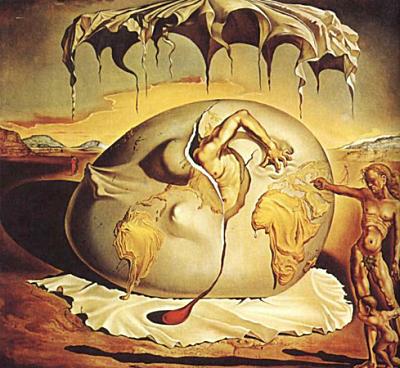
Geopoliticus Child
Watching the Birth of the New Man
Salvador Dalí
b. May 11, 1904 1174 images
_______________________
cynically say the world is that way
jane dark's further excerpt from Joshua Clover's 1989: Bob Dylan Didn't Have This to Sing About
sugarhigh!
This loss of narrative has presented itself earlier, most evidently in songs that try and fail to make a story of the times. But of course the sense is everywhere in the music this book has considered: in the triumph over time; in the exstasis; in the absolute, empty domination of the present moment; in the inability to imagine what might come next, and the lack of an urgency to do so. We have scarcely had occasion to mention the best-loved song by British alternative pop act The Sundays: "Here?s Where the Story Ends." The lyrics are opaque, as if the story already can't quite be recalled. "It's a little souvenir of a terrible year," choruses Harriet Wheeler, hiding nothing and everything. The song is from 1990; we never discover what the "it" is.
Narrative failure, it scarcely needs to be said — the end of story — is another way of naming the thought which is "the end of history." This is the very sense in which Fukuyama's proposition deserves attention as something more than mere neoconservative wish fulfillment. It is the pop flipside, the form taken within the public imagination, of Guy Debord's less catchy descriptions: "The spectacle, being the reigning social organization of a paralyzed history, of a paralyzed memory, of an abandonment of any history founded in historical time, is in effect a false consciousness of time."
For Fukuyama this abandonment of any history founded in historical time is an overcoming; for Debord, what must be overcome. For both it is the situation. The question before us, finally, is not whether pop music understood this situation; by now this book's opinion on the matter is obvious. Rather, the question is whether pop music was able to have more than a triumphal sense of how things stood around 1989, as the new conjuncture was coming into view and asserting its absolute quality.
How then can this conjuncture be described?...(more)
_______________________
Architecture and Resistance
Lebbeus Woods
The word resist is interestingly equivocal. It is not synonymous with words of ultimate negation like ‘dismiss’ or ‘ reject.’ Instead, it implies a measured struggle that is more tactical than strategic. Living changes us, in ways we cannot predict, for the better and the worse. One looks for principles, but we are better off if we control them, not the other way around. Principles can become tyrants, foreclosing on our ability to learn. When they do, they, too, must be resisted.
Resistance Checklist:
Resist whatever seems inevitable.
Resist people who seem invincible.
Resist the embrace of those who have lost.
Resist the flattery of those who have won.
Resist any idea that contains the word algorithm.
Resist the idea that architecture is a building.
Resist the idea that architecture can save the world.
Resist the hope that you’ll get that big job.
Resist getting big jobs.
Resist the suggestion that you can only read Derrida in French.
...(more)
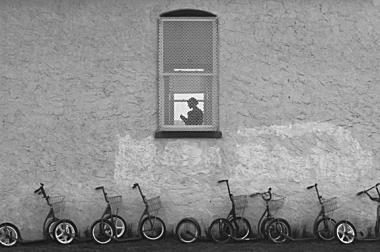 Robert Weingarten
1 2 3 4
_______________________
Beyond Between: Translation, Ghosts, Metaphors
Michael Emmerich
In order for "translation" to have any meaning at all, it must be translatable into other languages; but the moment it is translated, it is swept up in a system of differentiations different from the one in which it is enmeshed in English—indeed, it doesn't even have to be translated, because the word itself implies its own connectedness to these other systems of differentiation. Translation must be viewed as a node within which all the ideas of translation in all the languages there ever have been or could ever be might potentially congregate, intersect, mingle. Or we could say that the word "translation" is haunted by all the concepts it might translate, the words with which it may be translated. A word like "dog" can be understood, if only provisionally, in terms of its difference from an (indefinite) string of other terms in English; "translation" is made doubly provisional by its inevitable connection to other, non-English ideas of translation that could, at any moment, be brought to bear on the English word, just as the English word can be brought to bear, through a subtle process of productive mistranslation, on the Japanese word hon'yaku. "Translation" is, that is to say, always waiting to be redefined, not through its difference but through its similarity to other terms in other languages.
If this is not as obvious as it probably should be, it is because too frequently we consider translation from a perspective that has nothing to do with translation. We focus almost exclusively on translations. There are originals and translations, source texts and languages and target texts and languages, domestic and foreign, those who commission translations and those who consume them—everything but translators engaged in the act of translation. There are several reasons for this. The most important, perhaps, is that it is difficult to get a handle on what exactly a translator is doing when she translates. Consider this description of the process by Donald Philippi:
Whatever happens after a translator sits down at the computer, it isn't anything material. What realm do we enter when we boot up our computer, attune our mental faculties to that odd wavelength of ours, and ascend into the ethereal realm of the translator's daily praxis? The translator's consciousness is not focused on any object, but is rather liberated from the world of material objects. The translator's realm is on a highly abstract plane, rather like that of a mathematician, grammarian or logician. The material objects are distanced. The domain of consciousness in which the translator operates is detached from the whole natural world. Abstracted from reality, the translator operates outside the spatio-temporal system in the world of pure consciousness. As Edmund Husserl would say: "Between the meanings of consciousness and reality yawns a veritable abyss" (Ideas, p. 138). The translator's world is a world of incorporeal experiences based on contact with non-material relationships and concepts. The habit of dealing with these incorporeal substances gives translators a good ability to attain high degrees of abstraction and to intuitively perceive relationships which are not obvious on the surface. Ghostly relationships are moving around almost imperceptibly in the ether; it is our task to identify and catch them, pin them down, then radically demolish them and reassemble them into an equivalent in the target language.
This is a brilliant description of the experience of translating between "typologically diverse languages," but it is also alien to the everyday life of anyone but an experienced translator, or perhaps even to the everyday life of the translator, as the opening words of the passage suggest. Translation as an act is itself so foreign, you might say, that we feel compelled to domesticate it. We accomplish this through metaphors, by anchoring translation firmly in the "world of material objects," "the spatiotemporal system" outside of which the translator operates at the moment he is translating, speaking about translation as something that takes place between two languages, two cultures, two nations....(more)
Corridor of DreamsWords Without Borders May 2009
_______________________

A nation emerges:
65 years of photography in Mexico
_______________________
Attritions
Steve McCaffery
To write is to kill, that's all
Blanchot
essorer, autoriser, liquéfier, cancaner,
the burning ice which was of course
the body between paradox
inside a tent of skin
unwrapping organs with two eyes
they call (our) planets in orbit around
lost saturday's rotisseries
and we'll all be graduate students forever
in phonetic manners metaclosure
remembering parks forget
their golf course mandates in penumbra
the homeless
settle in as antimatter at the same time
a labyrinth of flint hits syntax
as a throat tongue and six teeth form
a hebrew letter meaning aids
intellect and capital in drag
the paper occupied by paint a "had-to"
into focus drawing out to new communities
from vertigo
the prostitution of intensities
rigidity perceived in floating rags of rays still
unperceived perceived
in would-have-if-itself-at-any price comes down to
the starving in the street a grammar of those poorest secondary skins
halts falteringly at hope
pelliculates in talking grass
the incandescent emphasis
on finger-nails a bacon strip of lip
the hand a novel being written
rotten eggs forgetting
...(more)
McCaffery at Pennsound
Sound Poetry - A Survey
Steve McCaffery
UbuWeb
_______________________

Robin Blaser
May 18, 1925 - May 7, 2009
photo by Stuart Davis
Blaser poems at East Village Poetry Web's Poetries of Canada
Blaser at PennSound
About Robin Blaser
Stan Persky
dooney's cafe
For all the disputes of local friendship–the bitchiness, bitter gossip, the “feuds”–the San Francisco poets of the early 1960s were indisputably engaged in a community of poetry. If the poems within a given serial poem resonated against each other, it can be equally said that the poems and books, the work of various poets–Duncan, Blaser, Spicer, but others such as George Stanley, Harold Dull, Joanne Kyger and Ebbe Borregard as well–also resonated with and against each other in this West Coast city that was easily seen as a double-city. There was the visible one whose streets, hills, and business canyons we walked, and the invisible city that bound us both to contemporary poets across the country–Charles Olson, Robert Creeley, Allen Ginsberg, Frank O’Hara and others–who were part of “The New American Poetry,” as well as across time, to poets in various lineages of a tradition that extended back from the preceding generation of modernists to the first bards.
In a 1968 essay, “The Fire,” Blaser expounded upon the San Francisco variant of this poetry. “I’m interested in a particular kind of narrative,” he says, what Spicer and he had agreed to call the serial poem, “a narrative which refuses to adopt an imposed story line, and completes itself only in the sequence of poems, if, in fact, a reader insists upon a definition of completion which is separate from the activity of the poems themselves. The poems tend to act as a sequence of energies which run out when so much of a tale is told.” Blaser describes this “in Ovidean terms, as a carmen perpetuum, a continuous song in which the fragmented subject matter is only apparently disconnected.” Ovid’s words, as Blaser cites them in his own translation, are
to tell of bodies
transformed
into new shapes
you gods, whose power
worked all transformations,
helped the poet’s breathing,
lead my continuous song
from the beginning to the present world
...(more)
Robin Blaser, 1925-2009: Death’s DutyStan Persky .....................................................
Moments
Robin Blaser
Thematicists think it all makes sense
Plato fucked the middle voice
Wilde said, 'Either those drapes go or I go'
bp : 'death words : "what I meant to say was"'
McCaffery : 'abstract ruin'
our battle with the book is our Buddhist battle
.....................................................
Charles Bernstein's Afterword to
The Holy Forest: Collected Poems of Robin Blaser
Robin Blaser’s poems are companions on a journey of life, a journey whose goal is not getting someplace else, but, rather, being where you are and who you are – where you is always in the plural.
In the plural might be a good motto for Blaser’s courageous and anti-declamatory poetics, his profound continuation, deep into the darkening heart of contemporary North American poetry, of Emily Dickinson’s core value: “I’m nobody … Are you nobody too?” For Blaser, it is not only nobody but also no mind, or “no” mind, for this is a poetics of negation that dwells in pleats and upon folds. Pleating and folding being Blaser’s latter day, Deleuzian, manner of extending his lifelong project of seriality....(more)
'Hippest man on earth'
Douglas Todd Vancouver Sun September 06, 2008
One Room To Another: Robin Blaser
damn the caesars .....................................................
a bird in the house
Robin Blaser
the truth flies hungry, at least and otherous,
of which--though it may be one--Kafka said troublingly,
it has many faces
it's
the faces one wants, tripping the light shadows of its
skin colours of its wordy swiftness, angry and solvent,
of its loud remarks
as of feeding flocks one
year, one, among the smallest birds in the Northwest, flew
into the house a darting, panic thought at the walls
and grasses perched on the top right corner of the frame
of Tom Field's painting wherein adulterous Genji is found
out--as Lady Murasaki reads from her blue scroll--and
permitted me to take it in my hand soft, intricate
mind honouring and lift it out into the air
and the next year, again, one flew into the house,
almost certain, like a visitor, gold-crowned winged
floating about odd discoveries and alighted on the brim
of the lasagna dish my hand trembled as I took it up
and moved slowly to lift it out of the window into
the air a kind of thinking like everybody else
looking for a continuing contravention of limits and
of substance
_______________________

Robert Weingarten
_______________________
Conscientious in limbo
Jörg Colberg
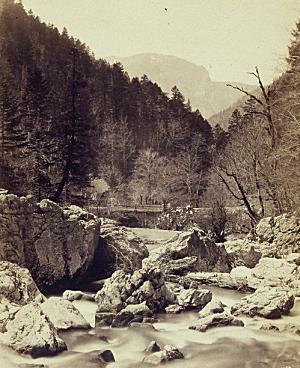
La Grande Chartreuse
Le Pont du Diable
V. Muzet
1857
Gabriel Cromer Collection
George Eastman House
_______________________
Axe Handles
Gary Snyder
One afternoon the last week in April
Showing Kai how to throw a hatchet
One-half turn and it sticks in a stump.
He recalls the hatchet-head
Without a handle, in the shop
And go gets it, and wants it for his own
A broken off axe handle behind the door
Is long enough for a hatchet,
We cut it to length and take it
With the hatchet head
And working hatchet, to the wood block.
There I begin to shape the old handle
With the hatchet, and the phrase
First learned from Ezra Pound
Rings in my ears!
"When making an axe handle
the pattern is not far off."
And I say this to Kai
"Look: We'll shape the handle
By checking the handle
Of the axe we cut with--"
And he sees. And I hear it again:
It's in Lu Ji's Wên Fu, fourth century
A.D. "Essay on Literature" -- in the
Preface: "In making the handle
Of an axe
By cutting wood with an axe
The model is indeed near at hand."
My teacher Shih-hsiang Chen
Translated that and taught it years ago
And I see Pound was an axe
Chen was an axe, I am an axe
And my son a handle, soon
To be shaping again, model
And tool, craft of culture,
How we go on.
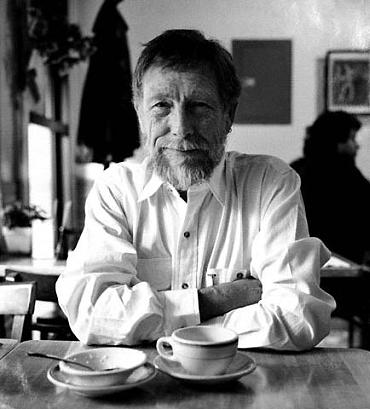
Gary Snyder
(born May 8, 1930)
photo by Allen Ginsberg
1991
second shaman song
Gary Snyder
Squat in swamp shadows.
mosquitoes sting;
high light in cedar above.
Crouched in a dry vain frame
– thirst for cold snow
– green slime of bone marrow
Seawater fills each eye
Quivering in nerve and muscle
Hung in the pelvic cradle
Bones propped against roots
A blind flicker of nerve
Still hand moves out alone
Flowering and leafing
turning to quartz
Streaked rock congestion of karma
The long body of the swamp.
A mud-streaked thigh.
Dying carp biting air
in the damp grass,
River recedes. No matter.
Limp fish sleep in the weeds
The sun dries me as I dance
.....................................................
Gary Snyder Poems
Turtle Island
Gary Snyder
google books
The real work: interviews & talks, 1964-1979
Gary Snyder
google books
Earth House Hold: Technical Notes & Queries to Fellow Dharma Revolutionaries
Gary Snyder
google books
Buddhist Anarchism
Gary Snyder
Bureau of Public Secrets
.....................................................
The flourishing commons:
disembodied conversation
Ivan Illich, Paul Goodman, and Gary Snyder
Whole Earth, Fall, 1998
The Wild Mind of Gary Snyder
Trevor Carolan
shambhala sun
Poets on the peaks: Snyder, Muir, Kerouac, Whalen
Whole Earth, Fall, 2002
_______________________

A. Briquet
ca. 1870
Gabriel Cromer Collection
_______________________
Hannah Arendt: Life is a Narrative
Julia Kristeva
Translated by Frank Collins
pdf
With forgiveness and promise, Arendt is persuaded that she has revived two 'regulating mechanisms' of public life that are essential and unsurpassable. This to the extent that they are situated at the very heart of what is most specific about this life, and the most risky, too,that is, the faculty of endlessly setting off new, unpredictable, and irreversible processes. Faced with these inexorable mechanisms of daily life, forgiveness and promise bring, in effect, 'a kind of judgement' that might be, definitively, a kind of wager on the possibility of a new beginning.(....)
Among the many 'difficulties' raised by forgiveness and promise, not the least is the very question as to whether they are possible. The radical exteriority from which Christlike forgiveness and promise proceeded, in order to enter the 'political world/ was called Transcendence of Faith. While evoking love for forgiveness, and legislation for promise, Arendt does not spare herself the requirement of thinking according to 'Archimedes' fulcrum,' which is needed if one is to establish the certainty that the who exists. She calls the supporting fulcrum, not God nor transcendence, but 'human plurality/ appropriating Kant's notion of an enhanced communicability that reaches a peace inducing cosmopolitanism. She seems to find a political version here of Duns Scotus's acquiescence, Nietzsche's amen, Heidegger's Gelassenheit. A certainty that is thin, fragile, but still playable: with taste, and by observing and recounting.
The Kristeva readergoogle books
New Maladies of the Soul
Julia Kristeva
Translated by Ross Guberman
google books
Powers of Horror: An Essay on Abjection
Julia Kristeva
Translated by Leon S. Roudiez
google books
Once below a time: Dylan Thomas, Julia Kristeva, and other speaking subjects
Eynel Wardi
google books
Julia Kristeva: live theory
John Lechte and Maria Margaronigoogle books _______________________
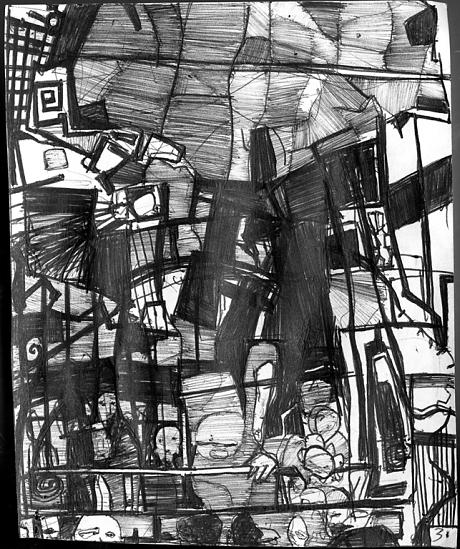
A screaming comes across the sky..
.Above him lift girders...
the carriage, which is built on several levels...
drunks, old veterans...hustlers...
derelicts, exhausted women with more children... Illustrations For Each Page of Gravity's Rainbow
Zak Smith
Thomas Pynchon
b. May 8, 1937
Does Britannia, when it sleeps, dream? Is America her dream? -- in which all that cannot pass in the metropolitan Wakefulness is allow'd Expression away in the restless Slumber of these Provinces, and on West-ward, wherever 'tis not yet mapp'd, nor written down, nor ever, by the majority of mankind, seen, -- serving as a very Rubbish-Tip for subjunctive Hopes, for all that may yet be true, -- Earthly Paradise, Fountain of Youth, Realms of Prester John, Christ's Kingdom, ever behind the sunset, safe till the next Territory to the West be seen and recorded, measur'd and tied back in, back to the Net-Work of Points already known, that slowly triangulates its Way into the Continent, changing all from subjunctive to declarative, reducing Possibilities to Simplicities that serve the ends of Governments, -- winning away from the realm of the Sacred, its Borderlands one by one, and assuming them unto the bare mortal World that is our home, and our Despair.
-
Thomas Pynchon, Mason & Dixon
Ekphrasis, Escape, and Thomas Pynchon's The Crying of Lot 49
Stefan Mattessich pmc
_______________________
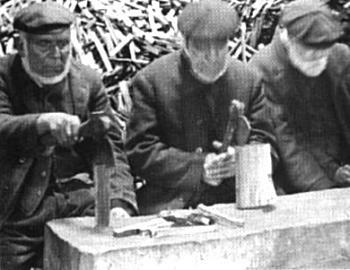
Wood chopping at Pontefract
1920s
The Workhouse
An incredible resource by Peter Higginbotham
_______________________
Domestic Wars Redux:
Obama, Digital Prohibition and the New 'Reefer Madness'
Dion Dennis
ctheory
... if past is prologue, the U.S. will not be without a new form of Prohibition for long, with a new set of targets constructed by a dominant demographic slipping from power; a new domestic "War" against a rival demographic, under the discursive cover of a newly fashioned political correctness. (It's just what Americans "do.") For example, after the passage of the Twenty First Amendment in 1933, it was not long before Prohibitionist impulses settled on a new target population, and a new set of cultural practices. In the 1930s, these impulses were instantiated in the Federal Bureau of Narcotics anti-Marijuana campaign, a campaign that demonized Mexicans and Mexican-Americans, and generated the perceptions that paved the way for the 1937 Marijuana Tax Act. In the second decade of the Twenty First century, the demonization geist will fall hard on those who remix and mash up digitized cultural icons and images. This uptick in a global "War on Pirates" is the contested site of an emergent generational "war," the latest site in which post-Baby Boomer generations, already saddled with elephantine debt, crumbling infrastructure, and intensive responsibilization techniques that shift governmental functions onto their privatized collective backs (think "service learning" and "civic engagement" initiatives) now face Boomer-based criminalization of their cultural practices of quotation and communication; all in the service of indefinitely maintaining Boomer-era models of cultural production, circulation and profit, in a post-Boomer world. It's the latest and onerous manifestation of "low intensity conflict," of a cultural guerrilla war that pits a subset of well-heeled and well-positioned Boomers against their children and grandchildren. The ramped up stakes are evident in recent high-level appointments in the Obama Administration's Department of Justice, and in the deeds of U.S. Vice President Biden and his Congressional allies. The conceptual coherence and persistence of these efforts point to a demographically-defined, and increasingly probable period of Digital Prohibition. The politics of Prohibition are alive and well; the population and objects have changed, but the general game resembles that of 1930s America. A brief look backwards, as prologue, is instructive. ...(more)
_______________________
Old Bones
Gary Snyder
Out there walking round, looking out for food,
a rootstock, a birdcall, a seed that you can crack
plucking, digging, snaring, snagging,
barely getting by,
no food out there on dusty slopes of scree—
carry some—look for some,
go for a hungry dream.
Deer bone, Dall sheep,
bones hunger home.
Out there somewhere
a shrine for the old ones,
the dust of the old bones,
old songs and tales.
What we ate—who ate what—
how we all prevailed.
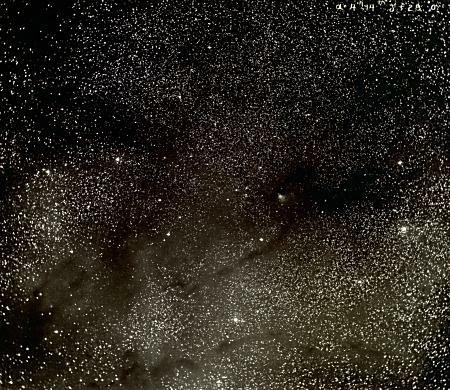
Nebulous Region in Taurus
Plate 5
An Atlas of Selected Regions of the Milky Way
E.E. Barnard
1927
via We Can't Paint
_______________________
Well Water
Randall Jarrell
What a girl called "the dailiness of life"
(Adding an errand to your errand. Saying,
"Since you're up . . ." Making you a means to
A means to a means to) is well water
Pumped from an old well at the bottom of the world.
The pump you pump the water from is rusty
And hard to move and absurd, a squirrel-wheel
A sick squirrel turns slowly, through the sunny
Inexorable hours. And yet sometimes
The wheel turns of its own weight, the rusty
Pump pumps over your sweating face the clear
Water, cold, so cold! you cup your hands
And gulp from them the dailiness of life.
.....................................................
Jarrell, the mother, the marchen
Alan Williamson
Twentieth Century Literature , Fall, 1994
"There is one story and one story only," Randall Jarrell was fond of quoting, from Robert Graves, about those poets whose enabling obsessions he felt he had penetrated to their depths. It was true of many of them, but truest of all of himself. Appropriately, since he was the most consciously psychoanalytic even of the poets of the "confessional" generation, his is a story that resonates with the earliest, most forgotten experiences of life, and with the senses of identity, relationship, and gender that begin to be formed there. To understand it is to understand why Jarrell's poetry has been accused of sentimentality, and why, at its most incandescent moments, it completely transcends that accusation.
Jarrell's story is, first and foremost, a story about our loneliness in the world, or about the world's failure to keep us: how to see things is not to be joined with them; how close, beyond the little circle of warmth our bodies cast, begins the unimaginably dead space that does not know us; how all the beauties, the fables of return, the talking animals, are a web of illusion cast over these unacceptable, irrefutable facts....(more)
.....................................................
'It's better to entertain an idea than to take it home to live with you for the rest of your life'
- Randall Jarrell, Pictures from an Institution
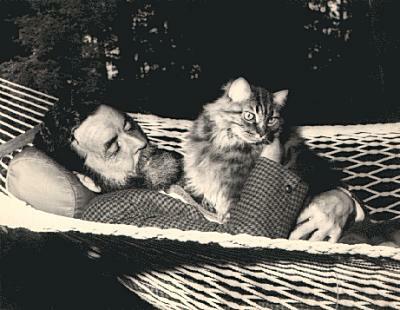
Randall Jarrell
(6 May 1914 – 14 October 1965)
.....................................................
The House In The Woods
At the back of the houses there is the wood.
While there is a leaf of summer left, the wood
Makes sounds I can put somewhere in my song,
Has paths I can walk, when I wake, to good
Or evil: to the cage, to the oven, to the House
In the Wood. It is a part of life, or of the story
We make of life. But after the last leaf,
The last light--for each year is leafless,
Each day lightless, at the last--the wood begins
Its serious existence: it has no path,
No house, no story; it resists comparison...
One clear, repeated, lapping gurgle, like a spoon
Or a glass breathing, is the brook,
The wood's fouled midnight water. If I walk into the wood
As far as I can walk, I come to my own door,
The door of the House in the Wood. It opens silently:
On the bed is something covered, something humped
Asleep there, awake there--but what? I do not know.
I look, I lie there, and yet I do not know.
How far out my great echoing clumsy limbs
Stretch, surrounded only by space! For time has struck,
All the clocks are stuck now, for how many lives,
On the same second. Numbed, wooden, motionless,
We are far under the surface of the night.
Nothing comes down so deep but sound: a car, freight cars,
A high soft droning, drawn out like a wire
Forever and ever--is this the sound that Bunyan heard
So that he thought his bowels would burst within him?--
Drift on, on, into nothing. Then someone screams
A scream like an old knife sharpened into nothing.
It is only a nightmare. No one wakes up, nothing happens,
Except there is gooseflesh over my whole body--
And that too, after a little while, is gone.
I lie here like a cut-off limb, the stump the limb has left...
Here at the bottom of the world, what was before the world
And will be after, holds me to its back
Breasts and rocks me: the oven is cold, the cage is empty,
In the House in the Wood, the witch and her child sleep.
Randall Jarrell
Randall Jarrell and the Lost World of ChildhoodCharlotte H. Beck Mississippi Quarterly_______________________

Pratt Institute Library
Dinanda Nooney
At Home in Brooklyn
The Nooney Brooklyn Photographs
1978-1979
_______________________
Critical reflections - photographic criticism
Max Kozloff
ArtForum , April, 1997
Twenty-one years ago, after having switched my field from art criticism to writing on photography, I started to make photographs as well, and in earnest, It afforded a surprised insight into the process from "behind" a medium I had previously regarded only from the front. But there was no reason that this new intimacy should require the sacrifice of a previous distance. I was beguiled by picture-making and attached to writing about the art of others. Why not - like a few colleagues - be responsible for both? Back then, one who let it be known that he simultaneously practiced an art and commented on it was looked upon as a dubious character. I recall the artist Scott Burton warning me that if I were to do pictures, then it was advisable to drop criticism, as he had (to my regret, since he was an excellent writer). One should not overtax the art world's ability, he said, to handle only one identity per person.
Nowadays that idea seems quaint, as we've long since become familiar with art that expects to be taken as criticism or that is indistinguishable from large or fine print. The tendency to fuse the discursive and the "figurative" was well underway in the '70s, and was recognized as a form of contracting two imaginative activities into one. In contrast, my more conventional idea was to divide my efforts, in acknowledgment of their separate categories and demands. Showing and telling might be wonderfully contaminated by each other in the mind, but they assert their sensory difference when practiced.
There must also have been a sort of politics implied in my instinctive move to a new medium. A liberal's ideal of social goods can only exist in great tension with contemporary art's radical individualism. As an art critic, I was constantly adjusting to yet resisting this regnant, aloof individualism. Put off by the coldness of late Minimalism, I was repelled by the aridity of Conceptualism, and the perversity of Body art. For that matter, I had trouble coming to terms with the remote, ahistorical absolutes of Modernism itself . . . and the authoritarian art writing that went with them. Unhappy time, the early '70s: the foreground war dragging on, and art in a high- or low-tech mode, numbed yet narcissistic. I remember the scene as self-assured but without a grasp, as if it had lost its hold on the times....(more)
via AMERICANSUBURB X
_______________________
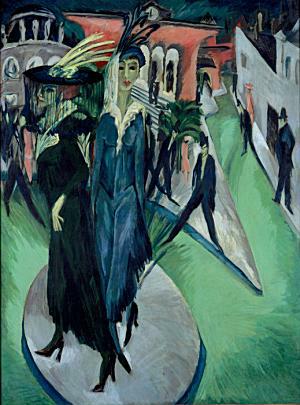
Potsdamer Platz
Ernst Ludwig Kirchner
(6 May 1880 – 15 June 1938) 189 images
_______________________
anality & available canons
Mark Scroggins
Culture Industry
I'm feeling, that is, overwhelmed by riches, to the point of being at a loss. I have probably a couple thousand volumes of poetry, most of it American, most of it published over the last 30 years, on my shelves & in stacks on my floor; and several hundred of those volumes I haven't yet read. As with my "unplayed" iPod playlist, I'm assiduously trying to work my way thru it all, trying to sift the gems from the - well, from everything else. But sometimes it seems like sheer volume of cultural production works to dull the ear & eye. When I listen thru the Pogues box set, for instance, I hear live versions & demo versions of songs that are interestingly different from the versions with which I'm familiar; but those differences don't register with the same impact they would have when I was in my early 20s, & played every new album four times over as soon as I got it out of the shrink-wrap. Too many books of poetry in a row & the genre itself seems to hover into a blur of disjunction, image, & musical line. When I bought my hot-off-the-press copy of Leslie Scalapino's that they were at the beach back in 1985, I read it till the spine broke. Now, even the most impressive new book is hard-pressed to provoke more than a 2nd or 3rd reading....(more)
_______________________

At Home in Brooklyn
The Nooney Brooklyn Photographs
1978-1979

Canadian Tulip Festival
May 1 to May 18, 2009
photo - mw
_______________________
Other
Dorothy Livesay
(....)
Tell me a time,
I have not loved,
A mountain left unclimbed:
A prarie field
Where I have not furrowed my tongue,
Nourished it out of the mind's dark places;
Planted with tears unwept
And harvested as friends, as faces.
O find me a dead-end road
I have not trodden
A logging road that leads the heart away
Into the secret evergreen of cedar roots
Beyond the sun's farthest ray—
Then, in a clearing's sudden dazzle,
There is no road; no end; no puzzle.
But do not show me! For I know
The country I caress:
A place where none shall trespass
None possess:
A mainland mastered
From its inaccess.
———
Men prefer an island.
...(more)
Archive for Our Times: Previously Uncollected and Unpublished Poems of Dorothy Livesaygoogle books
The Woman I Am
Dorothy Livesay
google books
An Interview with Dorothy Livesay
The self-completing tree: selected poems
Dorothy Livesay
google books
"A Thankful Music" :
Dorothy Livesay's Experiments with Feeling and Poetic Form
Lorraine M. York
Dorothy Livesay's poetics of desire
Nadine McInnis
Canonization or exclusion?
Dorothy Livesay's Wayward modernism from the 1940s
Esther Sánchez-Pardo
_______________________
Irony is a disciplinarian feared only by those who do not know it, but cherished by those who do. He who does not understand irony and has no ear for its whispering lacks eo ipso what might called the absolute beginning of the personal life. He lacks what at moments is indispensable for the personal life, lacks both the regeneration and rejuvenation, the cleaning baptism of irony that redeems the soul from having its life in finitude though living boldly and energetically in finitude.
(...)
It requires courage not to surrender oneself to the ingenious or compassionate counsels of despair that would induce a man to eliminate himself from the ranks of the living; but it does not follow from this that every huckster who is fattened and nourished in self-confidence has more courage than the man who yielded to despair.
- Søren KierkegaardThe Concept Of Irony, part 2, "Irony as a Mastered Moment. The Truth of Irony" (1841)

Søren Kierkegaard
(5 May 1813 – 11 November 1855)
The Sickness Unto Death
Sören Kierkegaard
trans. by Walter Lowrie
Fear and Trembling
Søren Kierkegaard
trans. by Douglas V. Steere The Point of View: On My Work As an Author
Søren Kierkegaard
Translated by Howard Vincent Hong
google books
Commentary on Kierkegaard
D. Anthony Storm
Wittgenstein and Kierkegaard
Religion, Individuality and Philosophical Method
Charles L. Creegan
full text of the book
The impression that Kierkegaard and Wittgenstein are not participants in the same universe of discourse might be further substantiated by the fundamental difference in their motivations. Kierkegaard felt a vocation of religious edification, which he discovered and expressed through his relations with other people, his father, fiancée, and bishop being chief among these. His appeal to the categories of philosophy derives from his psychological perception of the religious 'need of the age.' Wittgenstein came to philosophy through its connection with fields far removed from religion. He began as an engineer, and engaged certain technical questions in the philosophy of mathematics and logic as a natural outgrowth of this interest. Eventually his investigations into symbolism led to a more general interest in language; the language of religion is only one of the examples he considered. Once again, there is a considerable difference to be seen.(...)
In the midst of their legitimate differences, there is one similarity between Kierkegaard and Wittgenstein which is striking. This similarity cannot be expressed in systematic categories: it is not a case of identity in academic specialization, nor yet of correlation in factual discoveries. Instead, it is a congruity of method. Both authors stress reliance on indirect methods of communication; both rely on such methods themselves. The term 'indirect communication' was coined by Kierkegaard. Wittgenstein's parallel concept, which carries over from the early to the later period, is the 'showing' of certain essential ideas or distinctions which cannot be 'said.' Both methods are based on the perspicuous presentation of evidence, rather than the advancing of 'theses,' concerning the various subjects under consideration. Since both authors are communicating indirectly, it is not surprising that some of the strategies of communication they use are the same. Certain features are repeatedly evident in their works. Among these are examples, reminders, repetition of the obvious, notes on usage, and stories. ...(more)
_______________________
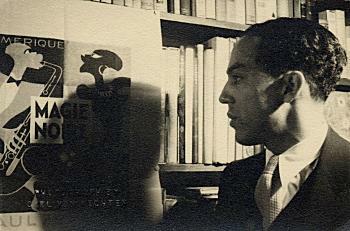 Langston Hughes
Postcards from Manhattan
The Portrait Photography of Carl Van Vechten
_______________________
Getting beyond: is photography a lost tradition?
Sara L. Marion
Afterimage , May-June, 2006
Poststructuralism, postmodernism, postmorality--the question of whether "post" is an accomplishment or merely an operative word seems to be an enduring dilemma. The question for photography since World War II has been whether the medium can excel to overcome a precluding rejection of the modernist era. The 1980s exacerbated this concept through its practice and term--postmodernism. Perhaps, then, a diarrhetic generalization of Modernism's claim for medium dominance is a type of media enlightenment that might be a historical occurrence that is applicable to photography with distinction.
An academic complaint in photography exists. Digitization, pixelation, and other means of capturing the imaging process and a more sculptural, three-dimensional, or "real" effect, have reduced the magician's chemicals to virtual reality. Beyond Edward Steichen, Alfred Stieglitz, and Paul Strand, another question to ask may be, "To what degree does a 'post-photography' era have the stamina to survive in a manner that can transform modernist photographic traditions and aesthetics, otherwise considered as classic?" It seems to present a practical and philosophical debate, given some current work.(....) "Without innocence, the artist is only a skilled technician," commented photographer Nathan Lerner of the Chicago Bauhaus School in 1974 when reflecting upon the lessons of Laszlo Moholy-Nagy. Innocence is usually the last characterization discussed when approaching a photographer's oeuvre, but the tendency for inspiration is a type of experimentation of ideas or concepts that may dissuade a preproduction schedule or commercialization of intent. In considering the famed, almost infamous, exhibition "New Topographics: Photographs of a Man-Altered Landscape" (1972), Bernd and Hilla Becher are usually a separate topic, particularly since their reform of the Dusseldorf School. Their analytic comparisons of communicable urban archetypes--water mills, cooling towers, industrial houses--presented in a matrix format from the 1970s, insinuate that the repetition of these structures moves beyond the industrial eye of Renger-Patzsch to something that may be more Druid-like in total observance. "All things wonderful," and perhaps captured as continuous, spiritual configurations, their photography is a powerful inspiration influencing the work of the school's students, such as Thomas Demand, Andreas Gursky, Thomas Ruff, and Thomas Struth. Larger than neon and as hauntingly glamorous as film noir, their photographs capture another form of portraiture. Supposedly acknowledging a greater German tradition in photography, the Becher's theoretical approach surpasses archetypes to become indicators....(more)
_______________________

Index of the Ordinary
Andrew Elliott via Heather Anne Halpert at blurry yellow
Yes, she of Lemon Yellow (begun March 31, 1999 - living on in the Internet Archives) I Link, Therefore I Am: a Web Intellectual's Diary
Heather Anne Halpert interviewed in July 22, 1999
via a mention by Mitsu Hadeishi at synthetic zero Lemon Yellow, Paul Perry's alamut and Jouke Kleerebezem's notes quotes provocations and other fair use (both begun in 1998 - now resting), along with synthetic zero (since 1999) were great favorites in the early days of the "s lot".
_______________________
History is photography: the afterimage of Walter Benjamin
Jeannene M. Przyblyski
Afterimage, Sept-Oct, 1998
... despite the scatter-shot access to his work, and despite the notorious difficulty of his prose style, Benjamin became a touchstone for the most influential photography critics and historians of the 1980s. Drawing on the insights of the "Work of Art" essay, John Tagg emphasized the withering away of the "aura" associated with unique works of art in favor of a photographic "democracy of the image." While the Modernist history of photography would be marked by various, increasingly elaborate attempts to distinguish art photography from commercial and amateur productions, the real pictorial revolution effected by photography concerned the ease with which individual likeness could be systematically recorded, giving photography a key role in bureaucratic institutions, including the police station, the insane asylum, the school and the prison. Tagg's analysis of the institutional uses of photography was complemented by Allan Sekula's increasingly historical deconstructions of the documentary authority of the "instrumental realist archive." Benjamin's famous proclamation about photographs as "scenes of crimes," Sekula argued, demonstrated the need to balance Benjamin's avant-garde interest in montage and its possibilities for provoking visual "shock" with a recognition of his rearguard investment in an empirical model of photography premised upon the "telling detail."...(more)
_______________________

Brad Temkin
_______________________
The Fallow Mind
Dorothy Livesay
1909 - 1996
The fallow mind in winter knows, its scope
And wide horizon are made narrow by
The rim of early dusk, descending blinds-
Last summer’s rocket buried under sand.
To soar and spin, to take the hand and whip
A leash of fiery comets through the sky:
To be crier or prophet, John or Isaiah, these
Wait in the mind for the world’s turning phase:
The time she lifts her head from blood-soaked fields,
From one-eyed houses, shattered, gaping towns,
The time she sees her brother’s son, and bears
Her ribs to his remembered healing blaze-
Then will the mind take a new stature on
And children thrive, who late last year were bombed
_______________________

Victoria Ryan Photography
_______________________
On Cosmopolitanism and Forgiveness
Jacques Derrida
Translated by Mark Dooley and Michael Hughes
google books
As enigmatic as the concept of forgiveness remains, it is the case that the scene, the figure, the language which one tries to adapt to it belong to a religious heritage (let’s call it Abrahamic, in order to bring together Judaism, the Christianities, and the Islams). This tradition – complex and differentiated, even conflictual – is at once singular and on the way to universalisation through that which a certain theatre of forgiveness puts in place or brings to light.
From this – and this is one of the guiding threads of my seminar on forgiveness (and perjury) – the very dimension of forgiveness tends to efface itself in the course of this globalisation, and with it all measure, any conceptual limit. In all the scenes of repentance, confession, forgiveness, or apology which have multiplied on the geopolitical scene since the last war, and in an accelerated fashion in the past few years, one sees not only individuals, but also entire communities, professional corporations, the representatives of ecclesiastical hierarchies, sovereigns, and heads of state ask for ‘forgiveness’. They do this in an Abrahamic language which is not (in the case of Japan or Korea, for example) that of the dominant religion of their society, but which has already become the universal idiom of law, of politics, of the economy, or of diplomacy: at the same time the agent and symptom of this internationalisation. The proliferation of scenes of repentance, or of asking ‘forgiveness’, signifies, no doubt, a universal urgency of memory: it is necessary to turn toward the past; and it is necessary to take this act of memory, of self-accusation, of ‘repentance’, of appearance [comparution]1 at the same time beyond the juridical instance, or that of the Nation-State. We ask ourselves, then, what happens on this scale. The ways are numerous. One among them consistently leads back to a series of extraordinary events, those which before and during the Second World War made possible, in any case ‘authorised’, with the Nuremberg Tribunal, the international institution of a juridical concept such as the ‘crime against humanity’. There was a ‘performative’ event of a scope still difficult to interpret.
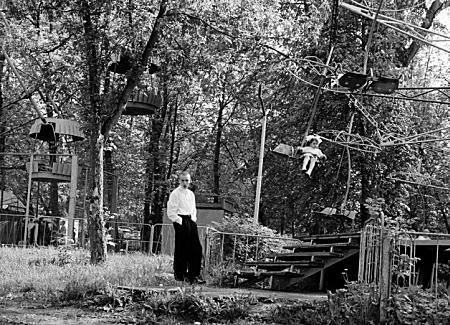
Psychology Of The Holiday
Valery Nistratov
_______________________
Tentacle Mind Report
Stefani Nellen
conjunctions
We are here, our tentacles coiled in the pond of Martina’s soul, the one untouched by the storm. We see everything. We saw everything. We float here in the cold until her lantern fish mind returns and chases us deeper into the dark. In slow, thudding heartbeats, we pass judgment.(....)
We can’t be destroyed. We don’t destroy.
We are here, our tentacles coiled in the deepest pond of Martina’s soul, the one untouched by the storm. We see everything. We saw everything. We float here in the cold until her lantern fish mind returns and chases us deeper into the dark. We burn with the anger of Martina’s mother stifling her sobs in the pillow, cursing herself for pushing her daughter out of the door. We ache with Eva lying next to Tim under a canopy of plastic tentacles. We laugh with Tim photographing Martina on a golden afternoon. We hold Martina while she bangs against the doors, and we won’t let go until one of them opens. In slow, thudding heartbeats, we pass judgment....(more)
More short fiction by Nellen 1 2 3 4and an interview
_______________________

Night Flight of Dread and Delight
Alexander "Skunder" Boghossian
1937 - 2003 A Tribute to Skunder
Alexander Skunder Boghossian
Ethiopian Passages: Dialogues in the Diaspora
_______________________
Subjunctivity
Michael D. Snediker reviews intimacies by Leo Bersani and Adam Phillips
pmc
Bersani and Phillips's recent book offers an important contribution (one might say non¬-contribution) to such performative scholarship, in its displacement of "that act" as we know it; in its trenchant argument that one of the most important things to do with words is not the instantiation of or flirtation with action, but rather the potentially indefinite deferral and reconceptualization of action, for the sake of holding a bit longer onto the uncertainties of words, the uncertainties of what is recognizable as action (in metonymic rather than metaphorical relation to language). intimacies presents theorizations of intimacy unhinged from desire as we know it, intimacies whose most (if not only) reliable component is a spatial closeness neither definitively predicated on nor leading to sexual inevitability.(....)That grammatical terminology could so importantly figure in the new forms of psychoanalytic engagement imagined by Bersani and Phillips attests to the extent to which intimacies extends the Lacanian aphorism of unconscious-structured-like-a-language to a differently fructive aphorism of writing-structured-like-psychoanalysis. To parse grammar is to parse persons--not because persons or subjects are textual (we've thought this for some time), but because the architectures of grammar invariably harbor and effect the pulsions of persons. Especially interesting for me is the way in which a grammatical lexicon could defer the further adventures of metaphoricity for the sake of the no less bracing lexicon of the non-transformative. The subjunctive, indeed, seems less a rhetorical shibboleth than a grammatical residuum, although with not too much imagination, the temporal openness of subjunctivity (as opposed to subjectivity) recalls the peculiar diachronics of de Manian allegory. I note the affinity between allegory and subjunctivity to reiterate the extent to which impersonality speaks only tangentially to the concerns at hand, the extent to which the subjunctive, in its gravitation toward mutability, is less a diminished mode of personality than a terrifically refractive and therefore richly complicated site of possible personality. The realm of the possible, in Bersani's readings, does not hover as ideation so much as assume the body of an actuality. What would it mean to imagine an equivalence between a person and the personification of that person's subjunctive possibilities? What would it mean to treat personification as an empirical (rather than a figurative) phenomenon?...(more)
_______________________
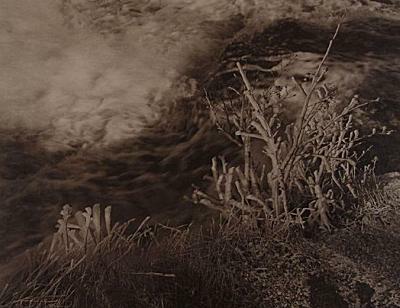
Vortex
Boundary Water
Koichiro Kurita
_______________________
Done!
Stefani Nellen
COSMOS magazine
He had tried to describe the effect of his routines to Sally. He saw her pained expression when she caught him during one of his rituals, and tried to convince her that it wasn't that bad.
"Ever seen domino stones fall into each other, Sal? The way they fall forward and nothing can stop them? It feels like that to me sometimes. Smooth. Right."
They sat up in bed, holding hands.
"I want you to be happy." She squeezed his hand. "Are you happy?"
Bob sighed. Skin flaked off his fingertips. Her supple, tanned hand stroked his.
Throughout his life, Bob had tried to reason with himself. Touching things in sequence and counting his touches didn’t make sense. Nothing disastrous would happen if he dried his face with Sally's towel or if he dried his nose before his brow. Nothing, except that drilling into the back of his skull, and the dull pain, as if someone pulled a molar out of his brain, and the sickening lurch of the world losing its contours. ...(more)
_______________________

Valery Nistratov
_______________________
In Ruins: Cioran amongst the Debris [pdf]
Dylan Trigg
Naked Punch
Cioran is an exception: ignored, bound by insomnia, and driven into self-imposed exile, his voice expresses philosophy’s resignation to failure. How shall we begin to understand a voice that is both allusive, duplicitous and moreover resistant to rigid examination? No tenacity of analysis or rigour of abstraction shall permit the reader a vantage point. On the contrary, one must also spit, scribble and scoff upon his words, debase them in port and musty odours, stub cigarettes upon the page before they can be understood. Do we not owe as much to him? (....)
Masking ourselves in our dreams we debase our desires so that they will inadvertently seduce us. We shall have to burn ourselves before we can realize our clarity. No noxious tincture of Schopenhauer, Schoenberg, or Schubert will ever redeem us. Mourning is an advent that espouses a multiplicity of meanings. In Cioran there is the propensity to defiance, in Bataille a vacillation between chastity and profanity (“a man eliminates himself from the rank of his kind” writes Cioran “by the monastery or some other artifice – by morphine, masturbation, or rum” ), in Nietzsche a retrospective tendency towards the Hellenistic polis. But we swoon in nostalgia when it comes to partaking of old relics. How then does Cioran approach the mounting decline with which his beautiful sense of Weltschmerz emerges? “Yesterday, today, tomorrow – these are servants’ categories”, he writes before eloping into reverie. Of course to consider there being a decline, to consider that we must straddle ourselves upon charred iron in the debris of Being, is to presuppose that time itself has allowed such fortune. We need to be led into the barrel before we can be drowned, need to be assured that we shall be worthy of somnolence before we can submit to collapse. Time cradles us, soothes us into demise by startling us with the glare of our own corrosion. A pleasure then to bathe the flesh in tepid water that creates the impression of an early death. But perhaps such pastimes are expendable, perhaps the pleasure is already at-hand. Able to project ourselves into a future whose absence is already conceived, then the nourishment of the derelict exposes itself. We intuit our decline by apprehending it, by tending to it and prolonging it like a lazy orgasm. That is our means of celebration which Cioran only hinted at. Until at last: “Silence, cooked like gold, in charred hands. Great, grey sisterly shape near like all that is lost.” Celan _______________________
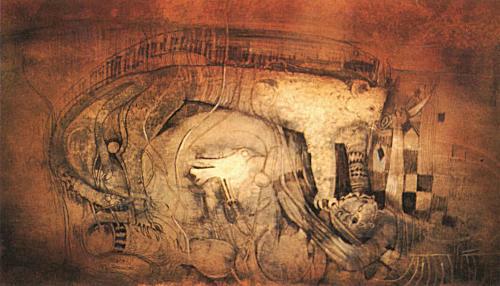
Rhonda's Bird
Skunder Boghossian
_______________________
Artificial Light
Tom Clark
Without it, what savage unsocial nights
Our ancestors must have spent! All those deadly
Winter nocturnes in caves and unillumined icy
Fastnesses: they must have lain around and
Grumbled at one another in the dark like the blind,
Fumbling each other's features for the wrinkle of a smile.
What tedious repartee must have passed! Perhaps
This accounts for the dullness of much archaic
Poetry, whose somber cast is notorious and must
Have derived from the traditions of those
Long unlanterned nights. Jokes came in with candles.
...(more)
_______________________

Koichiro Kurita

Frank van Wijngaarden
_______________________
The Anonymous Earth
Dylan Trigg
Side Effects
Phenomenology ... has a special relation to the unmasking the strange underbelly of everyday life. Above all, “It is an unfamiliar world in which one is uncomfortable and which forbids all human effusiveness” (Merleau-Ponty, 2006, p. 66). Easy to overlook the titanic power of this gesture. Yet a question can be posed in the face of this strangeness: If phenomenology assists in us rediscovering the things of the world in their phenomenological givenness, then where does this place the phenomenologist? The speculative answer would be: as the alien visitor to Earth, describing the appearance of things without yet prescribing their cause or effect. One way in which phenomenology does this is by decentering the centrality of humans at the heart of the world, and by encouraging us to attend to the radical wilderness underlying all modes of givenness and self-presentation. (....)
Merleau-Ponty:
…it may well seem strange that the spontaneous acts through which man has patterned his life should be deposited, like some sediment, outside himself and lead an anonymous existence as things. The civilization in which I play my part exists for me in a self-evident way in the implements with which it provides itself. If it is a question of an unknown or alien civilization, then several manners of being or of living can find their place in the ruins or the broken instruments which I discover, or in the landscape through which I roam (Merleau-Ponty, 2006, p. 405).
We have in this passage a clue concerning the rediscovery of things in the world. Merleau-Ponty draws our attention to the world we find ourselves in. Already it is a world that is a strewn with the marks and inscriptions of a former existence. All around us, the world contains traces of life-world, which have since disbanded. Although anonymous, these same inscriptions persist, only now divorced from their origins. The earth runs through this place but fails to come out the other end. Instead, an ontological marshland has been forged. The damaged terrain contains its own history, and the history protrudes through the surface. Thus the original strangeness of what phenomenology discerns—the world opened up is at once both familiar and unfamiliar, charted and uncharted, earthly and alien. ...(more)
.....................................................
Dylan Trigg interview
ReadySteadyBook
The Aesthetics of Decay: Nothingness, Nostalgia, And the Absence of Reason
Dylan Trigg
amazon _______________________
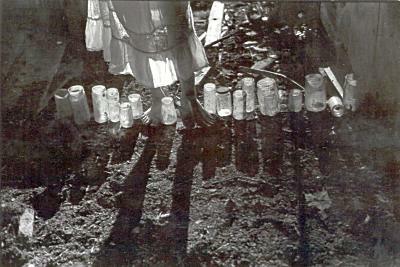
Syrie Kovitz
_______________________
The Situated Body
Janus Head Vol. 9, No. 2 Winter/Spring 2007
The Uncanny Body: [pdf]
From Medical to Aesthetic Abnormality
Alexander Kozin
In this essay I explore a possibility of experiential synthesis of the medicalized abnormal body with its aesthetic images. A personal narrative about meeting extreme abnormality serves as an introduction into theorizing aesthetic abnormality. The essay builds its argument on the phenomenological grounds; I therefore approach corporeality with Edmund Husserl and Maurice Merleau-Ponty. In turn, Max Ernst introduces an aesthetic frame for the subsequent examination of uncanny surreality. Two exemplars of the surreal body, Joel Witkin's "Satiro" and Don DeLillo's "Body Artist," intend to substantiate the preceding theoretic. The study shows how the encounter with the abnormal embodiment may suspend normalized modes of constitution to provoke uncanny experiences.
Merleau-Ponty's Phenomenological Itinerary From Body
Schema to Situated Knowledge: [pdf] On How We Are and How
We Are Not to "Sing the World"
Stephen H. Watson
from
Sestina [pdf]
Richard Hoffman
janus head
(....)At the heart of our foolish yearning for more is a paradox: as soon as we try to imagine a future that will not be too different from what we know, we have left the very present we hope will persist. The trouble seems to lie in the fact that one is present, truly present, truly living one’s life, only when one’s mind is where one’s body happens to be. And when. This is one rea son why a certain kind of work, the kind that requires both attention and physical exertion, feels so good. That kind of work—or play: a recent essay I read on skateboarding and another on singing come to mind—shapes us more truly than all our anxious attempts to change ourselves or the future we’re inevitably entering at every moment. Change requires first an acceptance of the state of things as they are now, not strenuous, heartless, and painful reshaping of one’s identity. To treat oneself as a lump of clay or ball of dough is not only foolish but disrespectful. It is the wrong kind of work and nothing but trouble.
_______________________
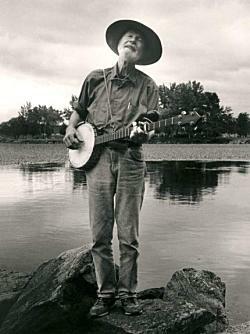
Pete Seeger
May 3, 1919 photo by Christopher Felver
Pete Seeger to celebrate 90th with Bruce Springsteen and friends
How Can I Keep from Singing: Pete Seeger
David King Dunaway
google books Pete Seeger and the psychology of hope
Mark Gilson
_______________________
I refuse to sum it up anymore; it's not possible.
I give it up
to the battering of songs against the light,
to the singing of the earnest cricket
in the last world of fire and trash.
-
The Last World Of Fire And Trash, Joy Harjo
_______________________

The Almanac Singers
1942 Bess Hawes, Pete Seeger, Millard Lampell,
Woody Guthrie, Arthur Stern, Sis Cunningham
(from left to right)
The Songs Of The Almanac Singers
Subversive Aspects of Popular Songs
Kenneth Rexroth
Bureau of Public Secrets
_______________________
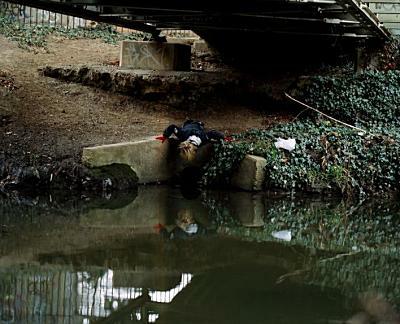
Andrew Burton
_______________________
Some Trees
John Ashbery
These are amazing: each
Joining a neighbor, as though speech
Were a still performance.
Arranging by chance
To meet as far this morning
From the world as agreeing
With it, you and I
Are suddenly what the trees try
To tell us we are:
That their merely being there
Means something; that soon
We may touch, love, explain.
And glad not to have invented
Some comeliness, we are surrounded:
A silence already filled with noises,
A canvas on which emerges
A chorus of smiles, a winter morning.
Place in a puzzling light, and moving,
Our days put on such reticence
These accents seem their own defense.
_______________________
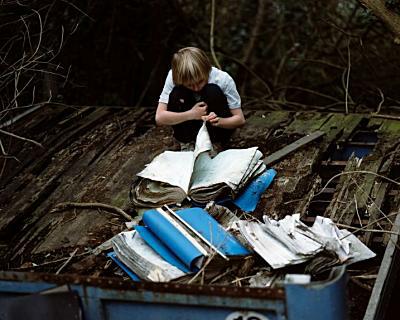
Nothing That Happens After We Are Twelve
Matters Very Much
Andrew Burton
via roo
_______________________
It all wears out. I keep telling myself this, but
I can never believe me, though others do. Even things do.
And the things they do. Like the rasp of silk, or a certain
Glottal stop in your voice as you are telling me how you
Didn’t have time to brush your teeth but gargled with Listerine
Instead. Each is a base one might wish to touch once more
Before dying. There’s the moment years ago in the station in Venice,
The dark rainy afternoon in fourth grade, and the shoes then,
Made of a dull crinkled brown leather that no longer exists.
And nothing does, until you name it, remembering, and even then
It may not have existed, or existed only as a result
Of the perceptual dysfunction you’ve been carrying around for years.
The result is magic, then terror, then pity at the emptiness,
Then air gradually bathing and filling the emptiness as it leaks,
Emoting all over something that is probably mere reportage
But nevertheless likes being emoted on. And so each day
Culminates in merriment as well as a deep shock like an electric one,
As the wrecking ball bursts through the wall with the bookshelves
Scattering the works of famous authors as well as those
Of more obscure ones, and books with no author, letting in
Space, and an extraneous babble from the street
Confirming the new value the hollow core has again, the light
From the lighthouse that protects as it pushes us away.
-
John Ashbery, from A Wave courtesy of with hidden noise

_______________________
Then came faire May, the fayrest mayd on ground,
Deckt all with dainties of her seasons pryde,
And throwing flowres out of her lap around:
Vpon two brethrens shoulders she did ride,
The twinnes of Leda; which on eyther side
Supported her like to their soueraine Queene.
Lord! how all creatures laught, when her they spide,
And leapt and daunc't as they had rauisht beene!
And Cupid selfe about her fluttred all in greene.
And after her, came iolly Iune, arrayd
All in greene leaues, as he a Player were;
Yet in his time, he wrought as well as playd,
That by his plough-yrons mote right well appeare:
Vpon a Crab he rode, that him did beare
With crooked crawling steps an vncouth pase,
And backward yode, as Bargemen wont to fare
Bending their force contrary to their face,
Like that vngracious crew which faines demurest grace.
-
Spencer, Cant. VII., The Mutabilitie Cantos
_______________________
The Origins And Traditions Of Mayday
Eugene Plawiuk
The Incomplete, True, Authentic and Wonderful History of May Day
Peter Linebaugh
_______________________
The First Mayday: The Haymarket Speeches 1895-1910
amazon
Voltairine de Cleyre's Haymarket Speeches
Librivox recording Voltairine de Cleyre (1866 - 1912) Archive The Voltairine de Cleyre reader
google books Exquisite rebel: the essays of Voltairine de Cleyre
google books
Radical Women: The Haymarket Tradition
Carolyn Ashbaugh
The Haymarket Tragedy
Paul Avrich
google books _______________________
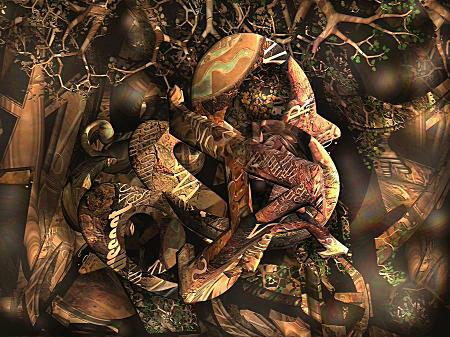
I want to dissect your language, otherwise
Four Visual Poems
Peter Ciccariello
otoliths
Otoliths - issue thirteen
southern autumn, 2009
edited by Mark Young
_______________________
Pitted Against Everything
Spurious
... perhaps there is a way of reclaiming for ourselves the efficacy of language, of speaking in a new way, not in a new language, but letting the old one resound differently. To disarticulate language, to discover the breaks at the level of syntax, to discover (to let there be discovered) a new style (a language within language, a rainbow that leaps up from the streaming of language) ......(more)
Words of Disorder
Spurious
(....)The Writing on the Walls
Can an order word become a word of disorder? Perhaps that is what flashed up on the walls during the Events of May 1968. We might remember the handbills and pamphlets distributed in those weeks from the Committee of Writers which were subsequently published as 'mots de désordre' and identified as the work of Blanchot. As his work - but Blanchot was not alone - there were the other members of the Committee, who worked together to formulate ideas to which they could all sign their names, and of course the participants of the Events themselves.
Tracts, posters, bulletins; street words, infinite words; it is not some concern for effectiveness that makes them necessary. Whether effective or not, they belong to the decision of the moment. They appear, they disappear. They do not say everything, on the contrary they ruin everything, they are outside everything.
There will still be books, and worse still, fine books. But the writing on the walls, a mode that is neither inscriptional not elocutionary, the tracts hastily distributed in the street that are a manifestation of the haste of the street, the posters that do not need to be read but are there as a challenge to all law, the disorderly words, the words, free of discourse, that accompany the rhythm of our steps, the political shouts - and bulletins by the dozen like this bulletin, everything that unsettles, appeals, threatens and finally questions without waiting for a reply, without coming to rest in certainty, will never be confined by us in a book, for a book, even when open, tends towards closure, which is a refined form of repression.
A complex assemblage: the man Blanchot, 'pale but real' as Hollier remembers, the writer part of the Committee (with Duras and others); the stop [arrêt] put to the book, of the liberal-capitalist world with which the Events were a break; what Blanchot calls Communism, intolerable, intractable, as it is excluded from any already constituted community - that foreign party [le parti de l'étranger] that points the way outside - 'out from religion, the family and the State', as Marx said when he called for the end of alienation (of what constitutes the human being as interiority, comments the author of these lines ('Blanchot', an effect of this fragmentary discourse, of language outside ...).
And isn't this what Deleuze and Guattari seek with their philosophy of language: not only to show that language is already outside, but to point a way that we might live in accordance with what falls outside us?
A community is not a people, says Blanchot. Communism leads us outside all interiorities. Is it possible to read the narrator's Slovenia (and perhaps Handke's) as more than a nationalism, as a celebration of a people (this is something Steve has been discussing for a long time)? And Repetition as being more than a book (what Blanchot names as a book)?...(more)
_______________________
Reading as a Material Event
Sinthome
_______________________
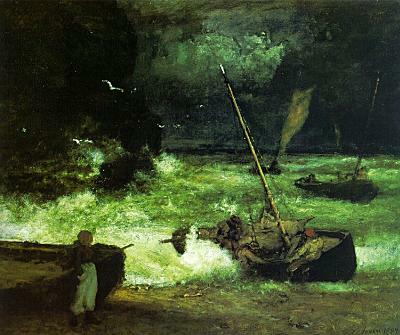
George Inness
(May 1, 1825 -August 3, 1894)
_______________________
Antithetical Understandings
Felino Soriano
otoliths
The parable spoke toward
easy acceptance of human
dichotomies. For within the
human’s textured voice,
myriad options keep colors
blowing a wind
close to existence, evocative of
damage or brushing off dust to reveal
the beautified layer of smiling
oceans. ...
...(more)
_______________________
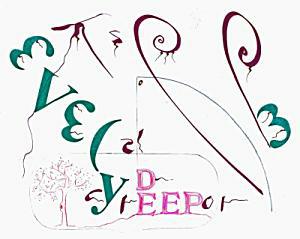
Tree
Ten Visual Poems
John M. Bennett, C. Mehrl Bennett & Geof Huth
otoliths
_______________________
making my bed of snow
Limited Inc
... I do not so much doubt the rupture Foucault describes as the linearity of the units he is using to describe it – the age, the epoch, the century, the ‘occidental’ culture. I prefer the move that Foucault makes in the seventies – where these unities are dissolved into fronts, mobile, diffuse, often overrun. It is the unities that Foucault is using, which come from the stock of universal history, which often make the reader of Les Mots et Les Choses –especially if that reader is even more a reader of the White Mythology – pause. A false sound comes from the bell.
The Other comes in bits and pieces – there’s no invention of it here, no sudden act of creation. That is simply the impression one gets from the point of view of universal history. Suddenly, a specter is haunting Europe. The Other is not so much resistant to the grid of the Great Tradition, with its obsessive knowing, than invisible to it. The Other, in other words, finds itself in another zone, a zone defined by the adventurer – by the possibility of adventure. In the world of the Great Tradition, adventure dissolves and is allocated to other vocations; in the world of the Little Tradition, the adventurer is a threat, either for good – the saint – or for evil – the witch. But the adventurer has his or her own zone, a zone under the sign of discovery, and here communication is, at its most primary, the exchange of intersignes.
Is this what I meant? ...(more)
_______________________
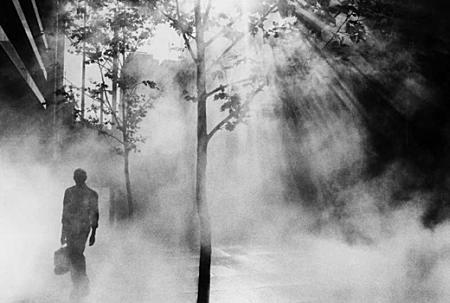 dream/life and beyond
Trent Parke
Stills Gallery
_______________________
The Last Generalist
An Interview with Richard Powers
Cultural Logic
The novelist's job is to say what it means to be alive. I don't think there are any wrong ways of doing that; I think there are wrong ways of not doing that, of avoiding it, but I think there's nothing that you could throw into that hopper that would be irrelevant. The more you can treat -- providing you can continue to synthesize it into something that's both intellectually and emotionally engaging -- the better. Right now a lot of fiction restricts itself totally to dramatic revelation, raising a lot of proscriptions about the way that fiction can and can't function. The direct introduction of discursive material has been considered anathema for a long time. I've been trying in different ways to violate that prohibition from my first book on. True, you can get more emotive power over your reader by dramatic revelation than by discursive narrative. But you can get more connection with discursive narrative! The real secret is to triangulate between these two modes, getting to places that neither technique could reach in isolation. Because that's how the human organism works. We employ all sorts of intelligences, from low-level bodily intuitions to high-level, syllogistic rationalism. It's not a question of which way of knowing the world is the right one.(...)
Connect. Inform yourself of all that is bigger and smaller than you. Interrogate progress. Be aware that what we can do doesn't have to determine what we want to do. In so many ways, my books mean to counter the unquestioned ascendancy of the technological world, the tacit assumption that we have to do what our inventions tell us to do, the blind acceptance of market-driven determinism. ...I think the politics of my writing hover around this idea that yes, we have constructed our buildings, but no, they don't have to construct us. If we keep from lying to ourselves, if we connect more to other gauges, to other magnifications, to other disciplines, if we keep asking ourselves about the nature of the project that we're on, then we can preserve our agency and better write the story that we're living.... (more)
_______________________

The Workers' May-Pole
Walter Crane
(1894)
The Illustrated Word
at the fin de siècle
_______________________
Open Access Directory celebrates its First Year Online
Bibliography of open access
Timeline of the open access movement
Open Access in Canada - Overview and Update
via ResourceShelf
|

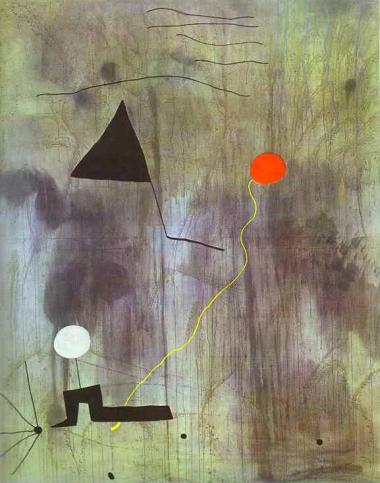
 Janus Head
Janus Head
 The Age of Briggs & Stratton
The Age of Briggs & Stratton


























































